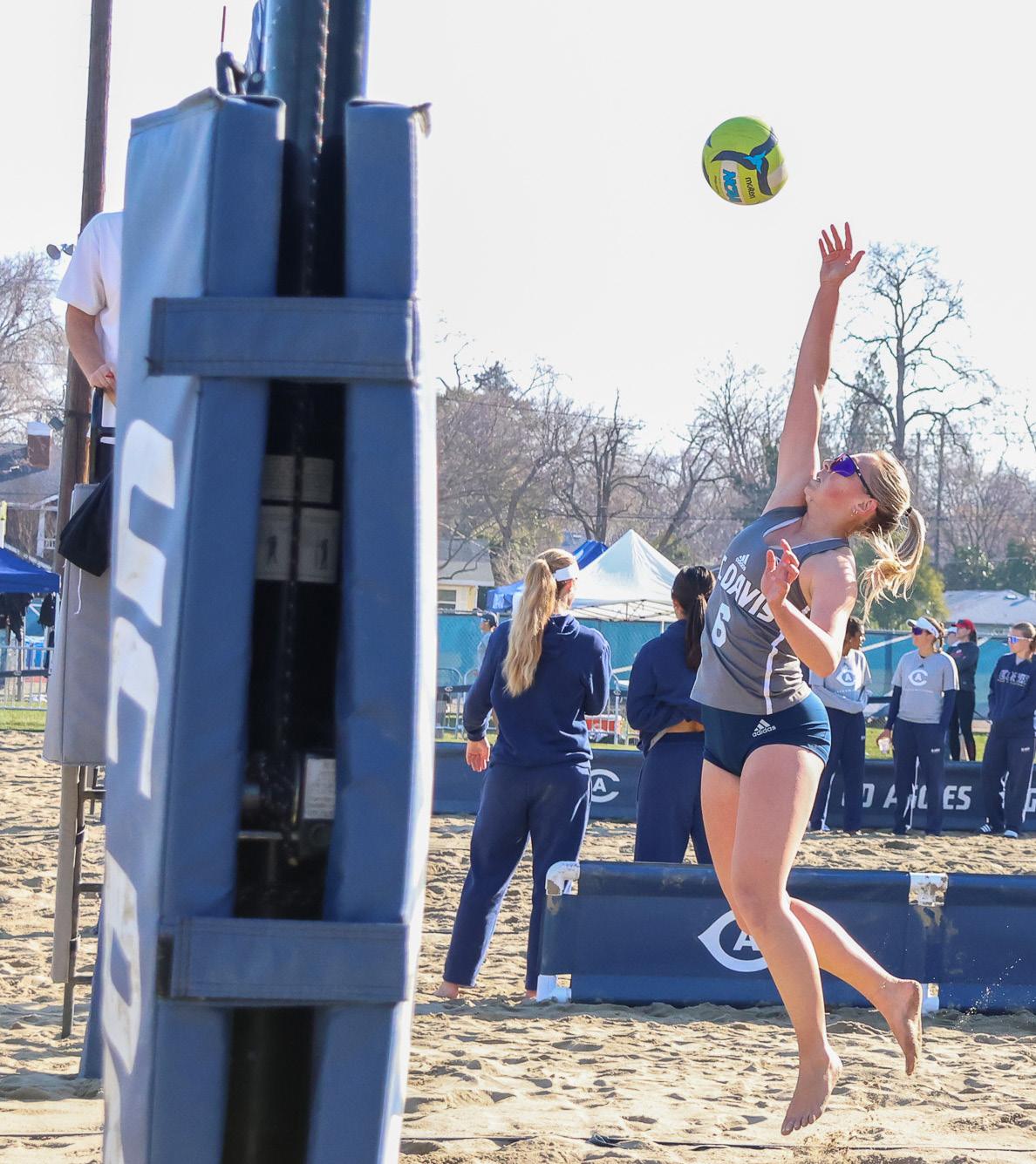






Humphrey Fellows gave talks on the USAID freeze, air pollution and fighting natural disasters
BY RORY CONLON city@theaggie.org
The International House hosted 12 UC Davis Humphrey Fellows from around the world for its Ignite Talks event on Feb. 21.
Te Hubert H. Humphrey Fellowship Program offers international public service professionals the opportunity to study in the United States and engage in practical professional development. Oliver Hack, the leadership manager of the Mandela Washington Fellowship for UC Davis Global Afairs, said the goal of the Ignite Talks is to give each fellow a platform.
“One of the most important leadership skills is public communication, so we challenge our fellows to do a five-minute TED Talk-style talk,” Hack said. “We call it an ‘Ignite Talk’ [because] the job of our speakers today is to try [to] ignite a thought in your mind. It’s also meant as an opportunity for them to share something about themselves with you and some little piece of the world, the universe and the human experience that is uniquely theirs.”
Kunan Vesselly, a fellow from Liberia, discussed the consequences of the 90-day freeze on all United States foreign assistance.
“Five of my friends, working for diferent [U.S. Agency for International Development] (USAID) projects, lost their jobs immediately,” Vesselly said. “Tese are just my friends — think about the thousands
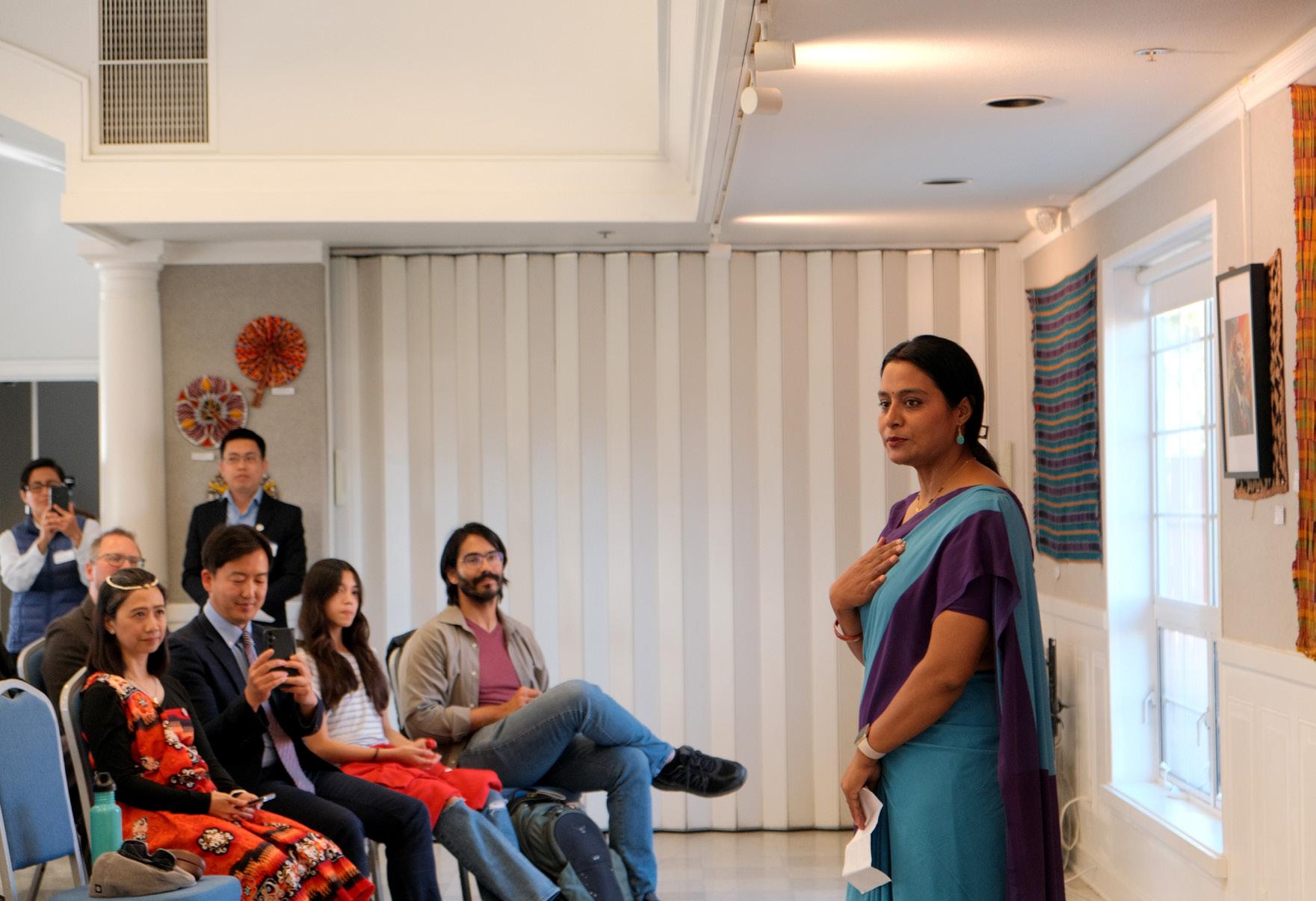
who lost their jobs abruptly, without adequate safety nets in place. Beyond employment, basic services in health and education, like the treatment of [human immunodeficiency virus] (HIV) and [acquired immune defciency syndrome] (AIDS) and school feeding activities, have been shut down.”
Vesselly advocated for three strategies to reduce Liberia’s reliance on foreign aid: investment in agricultural mechanization, industrialization and STEM education. However, he said the abrupt cutof of aid has halted progress toward these long-term goals.
“People are losing their livelihoods, families are falling apart, communities are crumbling, the future of kids [is] uncertain and nations are collapsing,”
Vesselly said. “I implore you today, as members of the Davis community, [...] to engage with your members of Congress to reassess the current foreign aid freeze because of its devastating consequences. Africa will move from handouts to handshakes, but this should be done gingerly, with the delicate nature of things taken into consideration.”
Begaim Alipova, a fellow from Kyrgyzstan, was head of the air quality monitoring department in the Ministry of Emergency Situations. She said the main lesson she learned through her work is that elections matter.
Te air we breathe depends on politics,” Alipova said. “In 2021, my team and I installed 50 local sensors in
March is nationally recognized as a celebration of the history and achievements of women and their contributions to society
BY OLIVIA HOKR city@theaggie.org
Women’s History Month is annually observed during the month of March within the United States to highlight the voices of women that sacrifced and fought to bring us to where we are today.
In Davis, there are organizations, such as Soroptimist International, that dedicate their time to promoting gender equality and education. Lori Hansen, the president of Soroptimist International of Davis, shared more about the founding of the organization and its mission.
“Soroptimist International is a global volunteer organization with a network of nearly 65,000 members in 118 countries,” Hansen said. “It was founded in Oakland, California in 1921 at a time when women were not permitted to join service organizations. Our chapter, Soroptimist International of Davis, was formed in May of 1954. [...] Our mission is to provide women and girls with access to the
our Editorial about
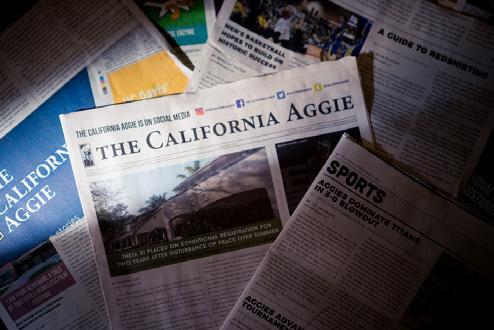
education and training they need to achieve economic empowerment. Our core values are gender equality, empowerment, education and diversity and fellowship.”
Two signature programs of the organization are called Live Your Dream and Dream It, Be It. Live Your Dream is a grant that clubs award to women who are fnancial heads of their household and are pursuing an undergraduate education or technical training.
“Many of these women have overcome hardships such as homelessness, foster care and domestic violence,” Hansen said. “We gave fve Live Your Dream Awards this year.”
Te Dream It, Be It program focuses on career development and mentorship for girls. Soroptimist International of Davis works monthly with a local continuation high school, Martin Luther King Jr. High School, to present about career paths and goal setting.
Te organization hosts fundraisers throughout the year to support their mission, including one coming up on March 9, Cuts for a Cause, at Creative Hair & Spa and Underdog Barbershop with all proceeds going to Soroptimist International. On top of fundraising, they participate in a variety of projects to serve the community.
“We also collect food for the [Short Term Emergency Aid Committee] (STEAC) neighborhood Food Project, make and fll toiletry bags for women at the domestic violence shelter and fll rescue backpacks for women escaping sex trafcking,” Hansen said.
Te Davis Food Co-op has a monthly benefciary for their Round Up At Te Register program and

updates their website after each month with the fundraising results.
For the month of March, Soroptimist International of Davis will be the benefciary.
“Founded in 1954, the Davis chapter actively supports the community through programs like the Live Your Dream Awards, which ofer fnancial assistance to women who are primary fnancial supporters of their families, and the Dream It, Be It career mentoring program for high school girls,” the Davis Food Coop website reads. “Additionally, they collaborate with local organizations to combat human trafcking and provide resources for survivors. Teir mission is to ensure women and girls have the opportunities to reach their full potential and live their dreams.”
During Women’s History Month, it is important to educate ourselves on the signifcance of the women who came before us.
WOMENSHISTORYon 9
Bishkek. For the frst time, air quality data ofcially became available online, updated every hour. In the same year, a new government came to power. But instead of using that information from sensors to fght smoke, they tried to hide the data. Only eight [sensors] remain today.” Alipova cited a 2021 World Health Organization report which found that 99% of the world’s population is breathing air that exceeds safe pollution levels. She said advocating for cleaner air is a joint responsibility.
“At the end of the day, Kyrgyzstan and the [U.S.] are not so diferent,” Alipova said. “[You] can be active in elections to ensure that the new government will prioritize green
solutions, speak up when serious issues arise and keep pushing forward, no matter how small the steps are, because every action counts.”
Muki Nampokolwe, a fellow from Zambia, works as a veterinarian in the Ministry of Fisheries and Livestock. She discussed her experiences with sexism as a woman in a maledominated feld.
“I’ve heard it all: ‘It’s too tough for a woman,’ ‘You will struggle [working] with large animals,’ ‘Men will always have the upper hand,’” Nampokolwe said. “Farmers have doubted me, clients have second-guessed my advice and colleagues have sometimes underestimated me. But over time, I have learned that the best response isn’t words — it’s results.”
Nampokolwe, who works with cattle, goats and bulls, calls her work rough, physical and unpredictable. She said the greatest reward in it is knowing that she can inspire the next generation.
“My work feels truly fulflling when my daughter looks up to me and says, ‘Mommy, I want to be a doctor like you,’” Nampokolwe said.
“More young girls are seeing that they, too, can do it: Tey can work with livestock, they can conduct surgeries and they can be leaders in animal health. It’s not just about breaking barriers. It’s about making sure that no one has to fght this battle alone.”



The meeting discussed the county’s mid-year budget report, guaranteed income programs and renovations to the superior court
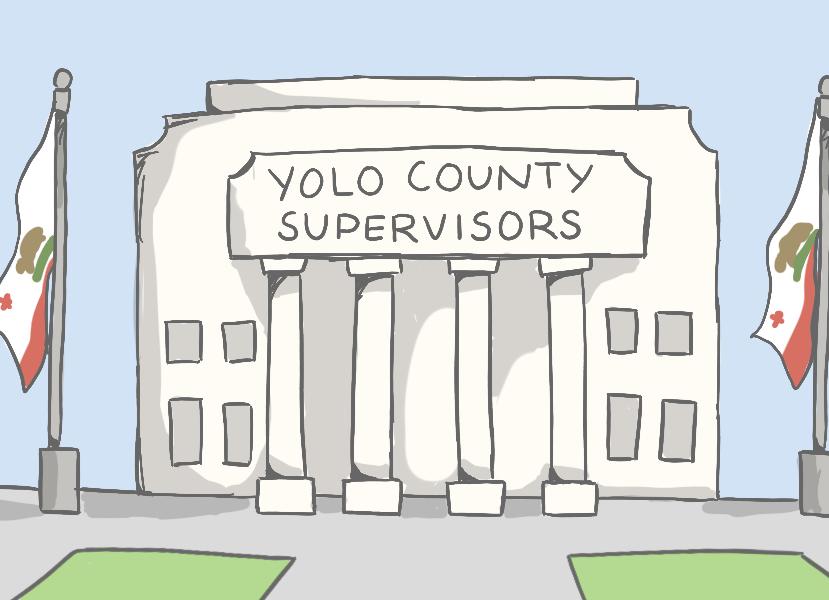
BY YUENJO FAN city@theaggie.org
On Feb. 25, the Yolo County Board of Supervisors met to discuss the 2025 mid-year budget, evaluate the Yolo County Basic Income Project (YOBI) and take reports from county subcommittees.
For discussions about the midyear budget, Laura Liddicoet, Yolo County’s chief budget ofcial, presented a comprehensive report summarizing revenue changes. Te report detailed how several revenue streams did not reach anticipated budget goals, meaning that the actual revenue did not match the projected numbers. Liddicoet also mentioned how most county departments are projected to yield a revenue surplus, but those numbers are lower than that of previous years.
“Major county revenues are projected to largely end the fscal year below budget,” Liddicoet said. “At the state level, sales tax receipts are coming in below anticipated levels. Te impact to us at the county is that our Prop 172 public safety sales tax revenue is projected to fnish the year almost fve percent below budget. Similarly, our public safety realignment growth was lower by approximately $27,000 than anticipated. [...] Locally, property tax is anticipated to be less than one percent below budget and, with a bit of good news, our general fund sales tax is expected to come in slightly above budget.”
Furthermore, Liddicoet addressed the board about the current solar panel malfunction issues the county is facing and how they have accrued into another expense. For Yolo County to meet new costs, the budget department will now look to use money from its contingency funds to pay of these new electric bills.
Te county is experiencing some issues with our various solar arrays,” Liddicoet said. “Tere have been extensive fnancial implications of the solar arrays being inoperative the past few months. Te most immediate of which is the state of the county’s electrical bill. [...] Initial analysis indicates that we are seeing $400,000 quarterly increases in our electrical bills with the arrays being down. As you can imagine, this is putting some constraints on various electrical budgets.”
Across Yolo County, there are numerous solar farms and arrays, including a one-megawatt solar panel in Woodland that powers the county’s justice departments. Te county is hoping for a quick end to the issues impacting the solar array and for fxes to their solar issue shortly. Te meeting then moved on to YOBI’s evaluations. Dr. Catherine Brinkley, a UC Davis faculty director for the Center for Regional Change and Community, took to the podium to discuss an evaluation of YOBI, one of the nation’s frst 100 guaranteed income programs. YOBI’s goal was to provide stability to community members at risk of fnancial and emotional stress, especially after the
events of the COVID-19 pandemic. Te program, which ran from 2022 to 2024, had its results brought in front of the county supervisors for review.
“One of the big fndings was a 62% increase in the number of YOBI families who reported that ‘Overall, my life feels more stable,’” Brinkley said. “We also saw statistically signifcant improvements in the number of YOBI families that could aford rent or own homes. We saw YOBI participants’ ability to [rent/own housing] move from 53% to 82%. Tose that were in [YOBI’s] housing support program saw an increase [in housing afordability] from 64% to 93%.”
Te YOBI program served 243 individuals and had an average stipend fund of $1,289. Monetary support for the program came largely from donors, while the county and UC Davis evaluated its efectiveness.
Moreover, County Supervisor Lucas Frerichs provided updates from the Historic Courthouse Capital Project Planning subcommittee. Te subcommittee is looking to move forward with a plan to provide further renovations to Yolo County’s superior court building in Woodland. To follow through with this project, the county is looking into working with UC Davis architects to design additional areas within the courthouse while also replacing older building infrastructure.
Tere’s a bunch of activities underway from actually securing the building to more immediate work around the outside of the building,” Frerichs said. “We’re working on a plan for cost estimates and funding for the inside and especially the third foor.”
Te plan is still in its relative infancy, with more comprehensive details to come.
Lastly, Yolo County fnalized Mike Webb’s appointment as the county’s new administrative ofcer. With 28 years of experience working for the city of Davis, including as a city manager, Webb’s new position will have him oversee county operations and budget.
Te Yolo County Board of Supervisors meeting typically takes place on Tuesdays at 9 a.m. in the county’s superior court. More information can be found on their website.
The Love Fair showcased local artisans, food producers and small businesses
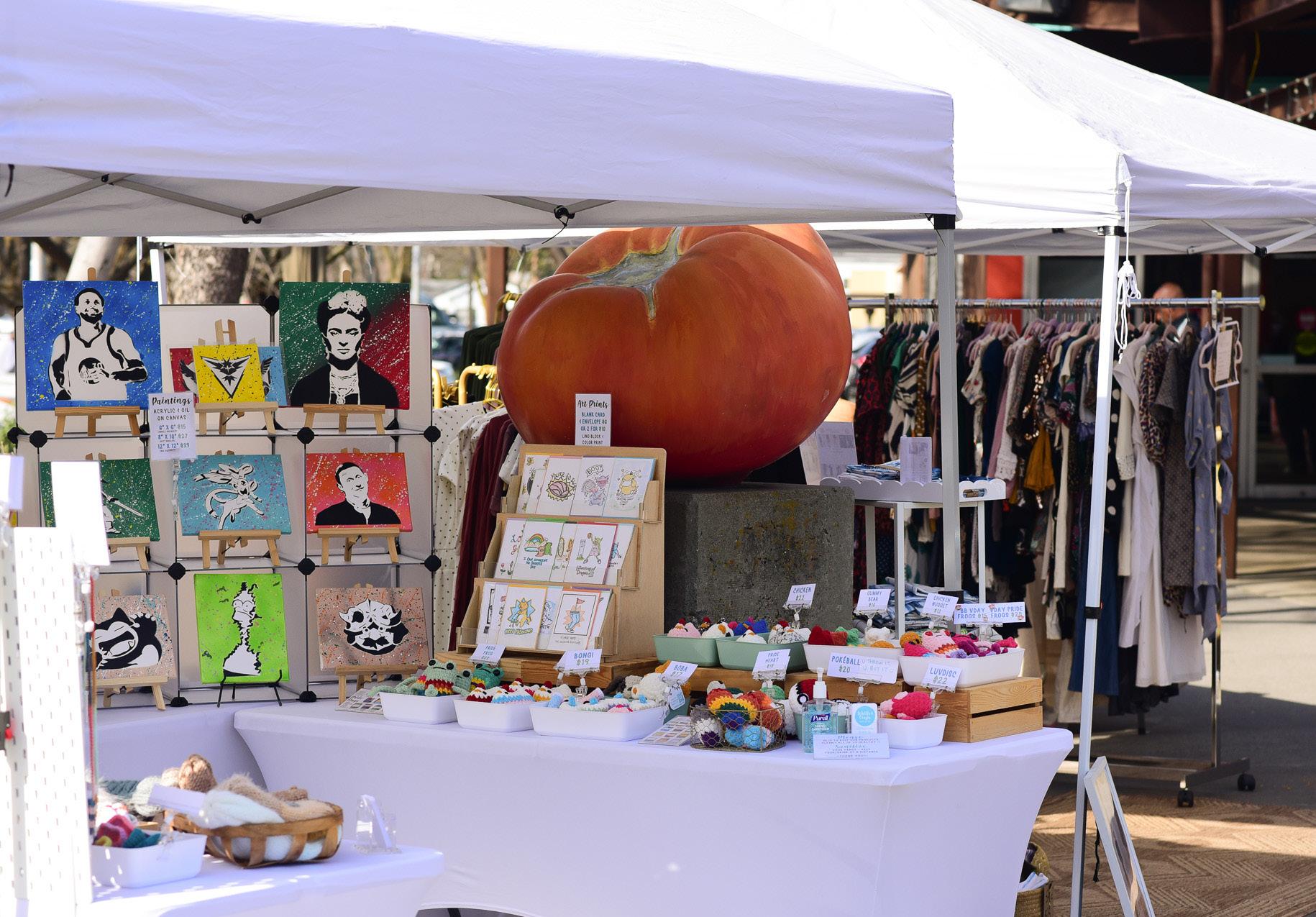
BY ALMA CULVERWELL city@theaggie.org
Te Davis Food Co-op’s Local Love Fair, held on Feb. 22, was a vibrant celebration of community and local talent. Te event featured an array of Davis and Northern Californian artists, ofering attendees the opportunity to engage directly with creators and sample products from local brands. In addition to the maker mart, co-op members enjoyed a special promotion, earning four times the rewards points on local items purchased between Feb. 22 and Feb. 29.
Te co-op’s commitment to fostering local businesses was evident through its diverse lineup of vendors, including Schiller Crafts, Pixley Ceramics and Estella Moon. Additionally, they ofered samples from Masala Blend, Mia Bea Wines, Rostam36 Brewing, Frate Sole Olive Oil, EO, Abernathy Lane Wines and Island of the Moon Honey.
Pinar Brummer, founder of Pixley Ceramics, shared her enthusiasm for the event, highlighting the personal connections fostered between artisans
and the community. Brummer creates everyday pots, including bowls, vases, teacups, small condiment bowls and bud vases.
“My studio came out of postCOVID frustration; how little time we are given and how there needs to be an immediacy to all our dreams,” Brummer said. “I am a scientist by trade, but I have always been a creative person. My studio is my outlet for all I have been keeping in my heart since I was very, very young.” She also expressed gratitude for the Davis Food Co-op’s commitment to local artists.
“Local Love Fair represents all the wonderful things about Davis Food Co-op, I think,” Brummer said. “What we are, what we make, what we produce in our town. And also, who we make these things for. I love the fact that I get to shake the very hands that will be using the teacup I made. Just the best feeling there is. But more importantly, as an immigrant, female small business owner, I am tremendously grateful for the inclusivity in events like this ofer.
Whenever I get an invitation from the lovely folks of the Davis Food Co-op, I say yes.”
Davis non-profit volunteers collaborated with Texas Trees Foundation as a part of a $22 million green schoolyards project
BY MATTHEW MCELDOWNEY city@theaggie.org
On Feb. 22, Tree Davis worked alongside the Washington Unifed School District (WUSD) to plant trees around River City High School. Te non-proft organization was founded in 1992 by former Senator Lois Wolk and former Parks and Open Space Administrator Bob Cordrey to help create a 40-year urban forest management plan and plant trees.
Since Tree Davis’ founding, the non-proft has worked with over 5,000 volunteers to plant over 12,000 new trees. Te non-proft also worked alongside the city of Davis and UC Davis on climate action plans and educational programs respectively.
Community members and volunteers alike were able to plant a total of 48 trees through the Cool Schools Yolo County program, according to the Tree Davis Instagram.
Community planting events such as the one at River City High School are part of only the frst stage of the Cool Schools Yolo initiative. As a partner of the Cool Schools Yolo, Tree Davis is working with nine Title I school campuses in West Sacramento and Woodland to plant trees, gardens and more. Te Cool Schools Yolo initiative is seeking to promote climate-ready, nature-based schools through a $22 million grant from the Cal Fire Urban Community Forestry Program.
Te Texas Trees Foundation — the organization behind the development of stage one of Cool Schools Yolo — unveiled the greening designs for River City, Riverbank, Yolo County and Westmore Oak schools in West Sacramento on March 1 during a community event and celebration. Additionally, Cool Schools Yolo will be making renovations to Beamer, Dingle, Prairie, Freeman and Whitehead Elementary Schools in Woodland.
Ellen Denk, the principal-incharge for Studio Outside — the landscape architecture practice responsible for creating the Cool Schools Yolo designs — went into detail about the exciting renovations to come.
Cool Schools Yolo will be
replacing heat-absorbing asphalt with wood, trails and garden spaces, according to Denk. By using naturally cooling surfaces, building shade and interactive playscapes, Cool Schools Yolo hopes to encourage students to enjoy their time outdoors.
“It’s too hot in a lot of areas of the county,” Denk said.
For schools like River City High, they will also be introducing interactive elements such as parkour, climbing, sensory swings and a statue of River City’s mascot — the otter.
Jillian Zwerdling, a science teacher and supervisor of the gardening club at River City High School, is excited for the nature-based teaching opportunities Cool Schools Yolo will provide.
“I’m defnitely most excited about the gardens,” Zwerdling said. “Te pollinator is a big plus. [...] Kids are really disconnected from nature, and so this is a nice opportunity to really enjoy the outdoors.”
Zwedling said she is especially excited to use these spaces to help make her classroom activities more engaging for her students. Zwerdling looks forward to conducting outdoor science labs like soil quality testing and weather monitoring for next year’s students.
Te Cool Schools Yolo is currently reaching out to contractors and expects to break ground for construction by the end of the 2024-2025 school year. Tey expect this project — two years in the making — to be complete by the start of the 2025-2026 academic year in the fall.
Information about donating to or working with Tree Davis is available on their social media and website. Te Texas Trees Foundation website also has further details on the progress of the Cool Schools Yolo project as well as their overall mission to ensure that “no child [is] left behind.”
Denk then made remarks about the importance of spending time outside and emphasized the importance of the Cool Schools Yolo County mission.
“I would love for a parent to be comfortable for their kids to spend time outdoors,” Denk said. “It’s a space for everybody to be comfortable in the environment and in their mind.”

to create easy-to-cook nutritious meals using Masala Blend,” Gupta said.
“Our goal is for people to make ‘Te Taste for Memories’ with their loved ones. As people cook nutritious meals and share them with their families and friends, they go beyond any cultural lines and also create awareness of the deliciousness in a variety of foods when made with love.”
Gupta also spoke about her dedication to maintaining highquality, chemical-free products.
Brummer also shared her positive experiences participating in other local events.
“I have done the Davis Cherry Blossom Festival market last year, and that was extremely well run, [and it] was a joy to be part of as well,” Brummer said.
Mamta Gupta, founder of Masala Blend, explained her ongoing relationship with the co-op and her journey collaborating with them.
“Masala Blend has been at Davis Food Co-op since 2020,” Gupta said. “Tey were our frst buyers and gave us the opportunity to connect with the community at large. We have learned and grown a lot with Davis Co-op guidance. We like to participate in the Local Love event at the co-op as we get to interact with the community and sample our products. Davis [Co-op’s] support for local businesses is what we love about them.”
Gupta, a former public school special education teacher, transitioned to selling spice blends full time in 2023. Inspired by traditional spices she learned to blend from her mother, she founded Masala Blends to provide easy, nutritious meal solutions.
“I love making blends for people
“We hand-make 24 diferent spice blends in micro-batches,” Gupta said. “All spices go through a cleaning process by hand. Each spice is then added or pounded into powder to the blends. We only add ingredients we can pronounce and that are commonly used around the world. No chemicals or preservatives are added, as I couldn’t even say them or know what they did. Our motto has been to be transparent with details on our products that anyone can read and understand.”
Another vendor, Flora Guilbaut from Estella Moon, an eco-conscious fashion brand born from Guilbaut’s own search for stylish, comfortable and sustainable postpartum clothing. After working in fashion for over a decade, she struggled to fnd clothing that ft her new lifestyle as a mother.
Guilbaut emphasized the importance of the event in showcasing and supporting small businesses.
“Showing love to the community, to the local artisans, growers and makers that make this cute little town cute,” Guilbaut said. “To shine a light on the creatives that live in this town? It’s hard to be seen these days, so these little markets are lovely ways to highlight the community.”
Guilbaut’s brand focuses on small-batch, slow production, using sustainable fabrics and deadstock
materials. All garments are cut and sewn in Downtown Los Angeles. She explained more about her favorite product, her best-selling, highwaisted, wide-elastic bias midi skirt.
“It has such a big stride you could literally go running in it — or chase after kids or run for the bus you almost miss,” Guilbaut said. “My clothes are made for busy people who just want to throw on something that will instantly make them look cuter and still be functional with a busy lifestyle.”
For Guilbaut, the event was also special on a personal level. Beyond connecting with customers, she cherished the chance to spend time with family and friends in a lively, welcoming atmosphere.
“My husband came by with my kiddo, Estelle, [...] and met up with her bestie in my booth, where they ran around in circles and ate lunch,” Guilbaut said. “Tey are the cutest and brighten my day always. But also, I loved seeing both strangers come check out my stuf and get to know what I do, as well as running into friends or people I didn’t expect to see. Life is so busy these days — it’s fun to talk and get to know your neighbors a little deeper.”
Te Local Love Fair exemplifes the co-op’s dedication to supporting local businesses and strengthening community ties. It ofers a platform for artisans and producers to showcase their work and connect with residents. Te Davis Food Co-op has several other exciting event opportunities planned for March, including four times the member rewards on local products, free samples, weekend crafting classes and more. For information on these events, check out the Davis Food Coop’s website.
The table held a debate over the constitutionality and efficiency of Executive Directive #10, passed SB#56 to clarify and codify appointment process of ASUCD elected officials
BY MADISON PETERS campus@theaggie.org
Te ASUCD Senate unanimously passed Senate Bill (SB) #56 on Tursday, Feb. 27 to to overturn Executive Directive #10. Te executive directive addressed the appointment of Chely Saens as the new External Afairs vice president (EAVP), who was set to take the role after former EAVP Zeph Schnelbach left the ofce vacant and EAVP Head of Staf Janani Sundaram passed on the position.
SB#56 was later vetoed by ASUCD President Gaius Ilupeju on Feb. 28. Saens, who currently serves as an ASUCD legislative director, assumed the role of acting EAVP on Feb. 18, one day after Schnelbach’s resignation. As the ofce was then permanently vacant, Article III, Section (5)(iv) of the ASUCD Constitution, which states that “the ASUCD President shall appoint a replacement for the EAVP should a permanent vacancy occur in the ofce prior to the end of the ofce holder’s term,” according to the executive directive, was enacted.
Te directive introduces a new appointment process, specifcally for the EAVP position, that includes candidates undergoing an interview during a special session, followed by two rounds of voting by the Senate table in a closed session and the appointment of the ofcial by Ilupeju after Senate discussion.
Ilupeju clarifed his intentions in the beginning of the directive.
“Te Executive Ofce wishes for the hiring process for a new EAVP to be as transparent as possible,” the executive directive reads. “I also want the Senate and the public to be thoroughly involved in the candidate selection so that the interests of the student body are best represented in this process.”
SB#56 called for clarity surrounding the directive and raised issues regarding the “redundancy” of how it outlined the appointment
process, as well as the constitutionality of the current appointment of the EAVP. It amended the executive directive on the grounds of a discrepancy between the directive and the ASUCD Constitution, given that in the latter “ASUCD Units are lumped under ASUCD ofces, under which all bodies follow the same appointment structure,” according to SB#56.
Tus, an alteration to the hiring process of the EAVP would difer from the ASUCD Constitution. Te goal of the bill is to “refect this discrepancy and avoid any conficts with the ASUCD Constitution in the future,” according to SB#56.
Senate Pro Tempore Dhilena Wickramasinghe read a letter authored by her and Internal Afairs Commission (IAC) Chair Amanda Clark, among other commision chairs, detailing their criticism with Executive Directive #10. Wickramasinghe said that the letter was never sent out, since they thought it would be more productive to have a conversation in person.
Amongst their issues with the executive directive was that it is “unconstitutional and overcomplicates the appointment process and goes beyond the President’s powers.”
Additionally, concerns about not being able to properly compensate Acting EAVP Saens for the amount of labor she would be putting into the appointment process, on top of their other duties, were addressed.
Wickramasinghe brought up Ilupeju’s communication regarding the directive and the lack of Senate involvement in the hiring process.
“President Ilupeju did not communicate to the Senate table or Acting EAVP Saens [about the new appointment process],”
Wickramasinghe said. “When I privately inquired about the EAVP hiring process, he didn’t give any mention that he wanted the Senate table to be involved in this at all.”
Wickramasinghe then called for a 10-minute unmoderated caucus
house concert to promote festival
Students attending WEF’s house concert shared their thoughts about the event

BY EVELYN SANCHEZ features@theaggie.org
Te lights were vibrant, streamers ran around the trunks of trees and the crowds were plentiful by the second hour. Fundraising through dance, live music, screen printing and supporting local vendors, Te Whole Earth Festival (WEF) put on a house concert on March 1 to not only welcome the warm air but rally excitement for their upcoming titular event on May 9 to 11.
Te event asked for a donation of $10 to 15 on a sliding scale, though no one was turned away for a lack of funds.
Rohini Murali, a fourth-year human biology and psychology double major, was one student who attended the WEF house concert.
“I really like the vibe,” Murali said. “Everyone seems really fun and it feels like an inclusive environment. It’s such a good idea to have live music.”
Tree bands were featured throughout the night: Moonbloom, Carabeza, illbie and Your Tax Dollars at Work, alongside intermittent shows given by the Pole Dance Club at UC Davis. Carabeza even featured merchandise at the event, in which the lead singer carved out a stamp and collectively imprinted the design on each shirt.
Katherine Krinsky, a fourthyear English major and one of the co-directors for WEF, ofered some behind-the-scenes information.
“For this event, my co-director and I, and some of my staf members, frst fnd a yard we want to use,” Krinsky said. “We ask [vendors] if they want to table, recruit the bands and have the opportunity to table and publicize WEF.” It was also WEF’s frst time hosting a show at Te Secret Garden, a local venue in Davis. Krinsky noted
at the end of the meeting to discuss the table’s opinions on overturning Executive Directive #10.
Senator Ezra Rubin brought up legal concerns regarding the overreach of the president’s power, as well as issues requiring an applicant to attend a public meeting as part of their hiring process.
Internal Vice President (IVP)
Aaminah Mohammad responded to the issues brought up by the table, assuring that there will be no delays in the hiring process if Executive Directive #10 is signed and that the table should hold on to their questions until Ilupeju could accurately address them.
Senator Amrita Julka then expressed her frustrations with the motivations behind the directive, pointing out that interim senators were not appointed through the process that the directive proposed.
“In the constitution, ASUCD units which have an established interview committee in the bylaws are listed as part of this bigger group under which elected positions such as the EAVP permanent vacancy position is also under, so it just seems kind of weird to have separate processes for that,” Julka said. “Even if you guys did want to bring this about in this way, communication would have been nice, not Friday at 8 p.m. It feels really wrong, it feels really manipulative. It feels like you’re trying to tell us what to do and that’s not the executive [ofce’s] job.”
Clark requested for clarifcation on what changed between the hiring process of the interim senators and the EAVP.
Mohammad provided reasoning for the switch.
Te hiring process for interim senators was a constitutional amendment, [and] the Constitution exists to allow for fexibility while the bylaws are there to list out specifcs,” Mohammad said.
She also brought up the amount of overtime she puts in throughout these hiring processes and reiterated that the
table should wait to ask their questions to Ilupeju, as he was not present to address all of their concerns.
Senator Siddharth Jasthi and External Afairs Commission (EAC) Chair Henry Rosenbach further expressed their disappointment with the directive, including delays in the hiring process and miscommunications between the Senate and Executive Ofce.
Rosenbach praised the work ethic of Saens and further stated a frustration with the Executive Ofce.
“To piggyback on what [Jasthi] was saying, working with the acting EAVP has been wonderful,” Rosenbach said. “Tey introduced legislation through EAC [...] and they put a lot of efort into that. Tere was miscommunication between my commission, the EAVP and the Executive [Ofce] [...]. It keeps looking like we are trying to do things and [the Executive Ofce] keeps pushing them back and back. We are trying to do ideas and projects and we are constantly [shooting] in the dark.”
Table members also brought up past issues with communication around Senate Resolution (SR) #7, afrming protections for undocumented students. At a previous meeting, Ilupeju had expressed criticism regarding the resolution and pushed to table it over concerns that not all relevant parties had been consulted.
“[Te] senate table got a lot of shit for not having those conversations with the people that [SR#7] impacts,” Julka said. “I’m just a little confused as to why this impacts us but we weren’t consulted on it? I know that, [Mohammad], you’re not the one who wrote it, so this isn’t necessarily a question to you but a question to [Ilupeju]: After SR#7, being like, ‘Oh we need to have communication with administration [...]’ but, we are right here; We meet with you [and] it’s very open to the public. I’m just a little confused as to why that conversation wasn’t had with us.”
Wickramasinghe said that she
thought the directive was “good in theory” and could be used for future hiring processes but that it needed to be improved upon and that there needs to be more communication between members of the table and the Executive Ofce. Senator Umar Shaikh ended the discussion by clarifying that Executive Directive #10 is a one-time occurance and is a conversation that needs to be had with Ilupeju present.
Te table then voted on a motion to overturn Executive Directive #10, voting 8-0-6, yes-no-abstain, with Transfer Student Representative Safa Mohammad, International Student Representative Muhammad Waqar, and Senators Ahmed, Cohen, Shaikh and Jenna Younes abstaining.
Te California Aggie tried reaching Ilupeju for comment, but was unable to reach him before publication.
Ethnic and Cultural Afairs Commission (ECAC) Chair Confrmation
Also at the Feb. 27 meeting, Faye Real, a fourth-year psychology and political science double major, was confrmed as new ECAC chair, taking over from former Chair Reem Suleiman.
Real talked about her goals to be more integrated with marginalized communities on campus and working with the Davis Criminal Retention Center.

Immigrants at Risk — What You Can Do forum addressed local immigration concerns
BY GIA LOOMIS city@theaggie.org
On Feb. 24, Congregation Bet Haverim (CBH) hosted the Immigrants at Risk — What You Can Do forum to educate attendees on current immigration enforcement and how it may afect the Davis community. Taking place from 7 to 8:30 p.m., the forum was free and open to the public at the church. For these forums, attendees are asked to register in advance and, while free to the public, donations are encouraged.
her coincidental initial joining of the WEF team.
“I joined WEF kind of by luck,” Krinsky said. “I had some friends applying for staf and because I liked working with kids, I [thought] it would be fun to do Kids Space. I had been to the festival before once [in] my freshman year — happened upon it, loved it and then decided it would be cool to join staf.”
Krinsky started with managing the Kids Space in her second year and managed the logistics section her third year, now managing the entire event alongside her co-director. Krinsky hopes that WEF can host one more house concert before the festival in May.
Ailani Corona, a third-year design major, was present at the event as a vendor.
Tis is the frst house concert
I’ve sold anything at,” Corona said.
“I heard about [WEF] through my wonderful roommates but also Professor [James] Housefeld as part of his lecture. I applied for [WEF] main events, and they emailed me about this event and [...] asked me to come in.” Corona is experienced in painting on glass or paper but has leaned toward selling her crocheted products, as she has been able to accommodate college students’ interests with more ease.
“I’ve been selling things since I’ve transferred,” Corona said. “But before that, I’ve been selling for three years, and I’ve been crocheting since [my] senior year of high school.”
Selling a large assortment of handmade crocheted animals and objects, an audience favorite being her tiny crocheted conchas, the Latinaowned small business can be found on her Instagram account, @artsy_ailani.
Te 56th Whole Earth Festival, with the theme “Earth to the People,” will be held at the UC Davis Memorial Union Quad from May 9 to 11.
Organized by the CBH Social Justice Committee in collaboration with the Yolo Interfaith Immigration Network (YIIN), the event strived to share information about current immigration enforcement given the rise and anxiety surrounding mass deportation eforts. In addition, the forum sought to inform individuals on how these enforcements are impacting local immigrants and what the community can do to help.
Tis forum was planned following the Social Justice Committee’s decision to make immigration their sole issue focus of 2025. Member of the committee and Co-Chair of YIIN John Katonah explained the inspiration behind this decision and the following forum.
“Our goal was to generate interest within the congregation (youth and adults) and invite them to become engaged in this [immigration] issue within Yolo County,” Katonah said. “I was asked to form a program that would bring in panelists who were very involved in working with immigrants to help the congregation begin to fnd ways to be of support to them during this very frightening time for the undocumented people in our midst.”
To highlight local immigrants’ experiences, the forum included a multi-speaker panel including local immigrants and the director of a local refugee center. Te discussion housed by this forum aims to push the community to better understand the situation created by recent changes in immigration policies and show attendees how to help respond to this developing situation.
Speakers on this panel included Ignacio Alarcon, a previous employee of UC Davis AB540 and Undocumented Student Resource Center, Ximena DiezJackson, the Davis Joint Unifed School District’s coordinator of language justice and family partnership, Dr. Natalia Deeb-Sossa, a UC Davis professor of Chicana/o/x Studies, and Usama Khalil, the chief executive ofcer and co-founder of Refugee Enrichment and Development Association.
The speakers addressed various issues with immigration enforcement,
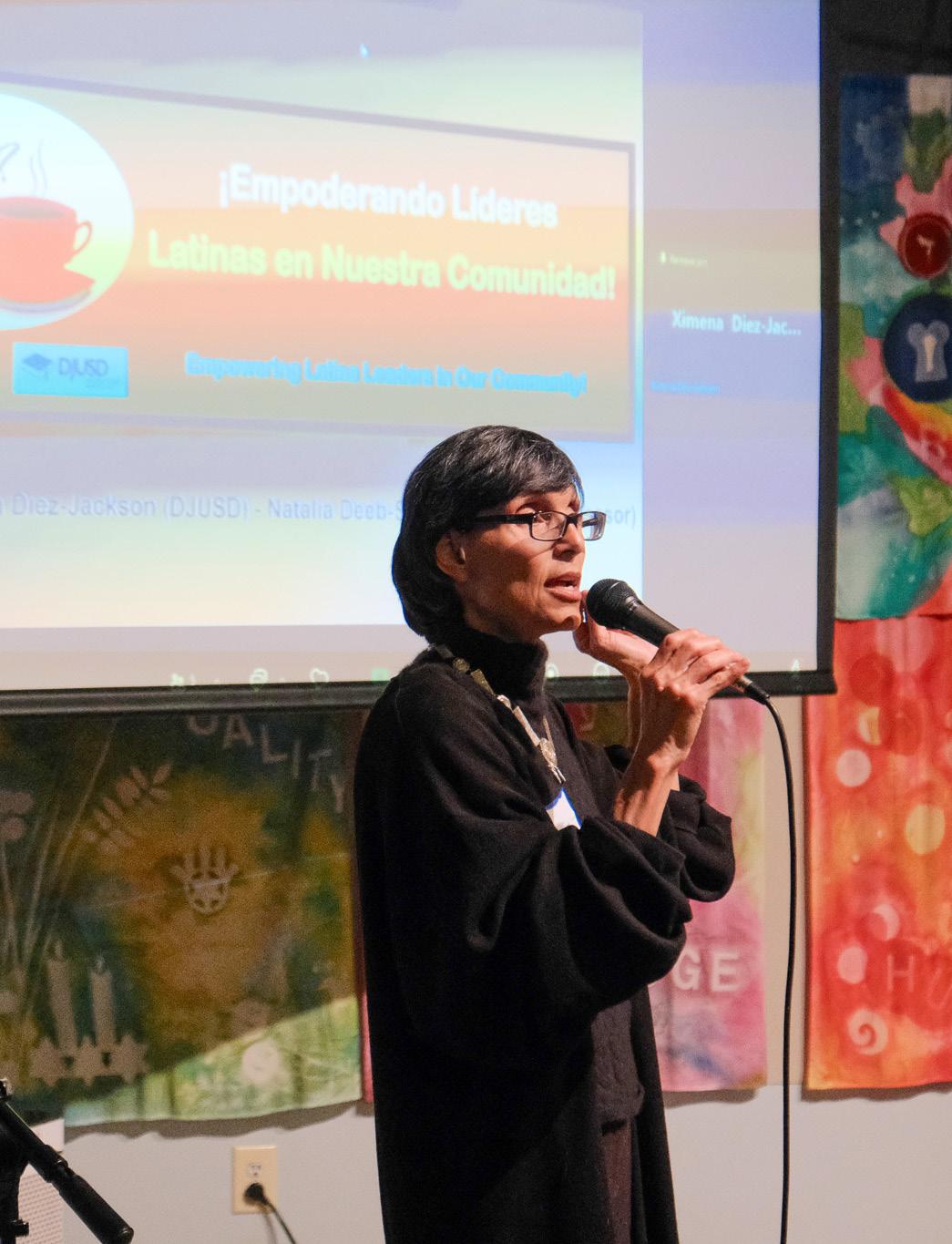
A speaker discusses effects of immigration enforcement. (Christian Cendejas / Aggie) focusing especially on the legal landscape that undocumented immigrants are currently faced with. Additionally, the panel presented several immigrant women who spoke on their fears surrounding immigration enforcement and what others can do to help.
By presenting a variety of speakers, CBH aimed to show the public the frst-hand experience and fear that immigrants are experiencing today. Katonah emphasized this by explaining the program’s hopes and intended impact. Tis program’s goal was to bring a deeper awareness of the conditions undocumented folks face now,” Katonah said. “Leading to ideas for action by the dominant white community who are privileged and therefore have power to make a diference.”
While CBH has hosted social justice-based events in the past, this immigration forum varied from similar events. Tis is the frst time since the COVID-19 pandemic that CBH has partnered with and included other groups outside of the congregation, like the YIIN.
Comparatively, CBH’s recent events concerning social justice were more focused on engagement within the church. On Feb. 21, the church
held Repro Shabbat with CBH Partner Lauren Salmo. At this event, they discussed reproductive health, rights and justice, stating their belief that reproductive freedom is a Jewish value. Tis event takes place annually on Shabbat as they read Parshat Mishpatim, which has verses often referred to when discussing the value of reproductive rights, according to the CBH website.
Katonah expressed the signifcance of this event, with over 150 people attending, as it enforced the severity of these growing immigration issues and helped raise donations for important immigration-focused organizations, to name a few.
“Just being together in unison for wishing to address the immigration issue as experienced in everyday lives brought a sign of hope,” Katonah said. “It was impressed on attendees that the issues mentioned are serious, causing families to fear becoming separated by deportations, losing jobs and income of family members who are forced to leave this country.”
While another immigration forum is not currently planned, check out Congregation Bet Haverim’s website and calendar for more information and updates on future events.
BY VIOLET ZANZOT vmzanzot@ucdavis.edu
I fgured the perfect introduction for this topic would be a good joke. I was going to write in “pause for laughter” and that was going to be even funnier. I fgured a good dad joke would serve best, so I used my friend as a sounding board to test some out. I asked her what you call fake spaghetti, why the cofee fled a police report and even why melons have weddings. All I got in return was a pity smile.
“It’s because you grew up most of your life without a dad,” I said.
“That’s why you don’t think these jokes are funny.” We both laughed. It was a beautiful moment. Now that my comment has been written down on paper, what I said seems to be a little dark and morose, but at the moment, with the right context, it was appropriate.
Tat whole story I just told is what my dad would refer to as a “shaggy dog joke” (I do not know why), defning it as “a long walk for a short drink of water.” A weird way to classify a joke, but it’s even more interesting that the joke is classifable to begin with. Humor needs to be particular in order to be successful — the content, the audience, the context of the joke being told and the goal outcome of the joke itself (are we going for just a smile or are we hoping to be rolling on the foor gasping for air) are all so important.
In the state of chronic tension in which we exist today, it feels even harder to reach an audience. Comedy is forced to walk an ever-thinning tightrope between the ofended and the ofensive: between the “too far” and the “not far enough.” Te turmoil begs the question: Is there a place for political incorrectness in comedy?
Saturday Night Live (SNL) just celebrated its 50th birthday on Feb. 16. Tat makes 50 years of boundarypushing, making light of the heinous, the morbid and the despicable for a laugh. 50 years of treading the tightrope. If you aren’t familiar with the show, I ask, “Where have you been?” (a prime example of an unfunny joke).
SNL is a live, late-night, variety, sketch, comedy show. As I mentioned, they trend toward political, grotesque and satirical comedy, but they are certainly not above the occasional cheap bit here and there.
SNL has historically been unique, because the entertainers are willing to “comedically [go] where others dare not go.” Cast members use words we’re not supposed to say and generally contemplate topics that are not suited for the dinner table: discussing rape, power relations, race, politics, gender, sexuality, violence — you name it, they’ve done a bit on it.
Tis characteristic in particular is why SNL has been so successful. Te shock of satire is so sweet. Humor can be a powerful tool to make people not just laugh but to think. I fnd that this is where the disconnect exists between what is ofensive and what people get ofended by. Sometimes, context gets lost in the bit.
Political incorrectness as a part of satire, saying a derogatory term for the sake of commentary, is a lost art. People jump so quickly to get mad that they miss the point, which is that they’re saying the same thing: the comedian just says it in a much funnier way. It’s better to admit you’re jealous of someone funny than it is to call someone out for being a bad person, when, in reality, humor’s nuance is complicated.
Tis is not to say that the hurtful thing is always said for a laugh; it is to say that understanding context is an
important skill if we want to exist in a world where our language does not have to be policed. Perhaps there is a diference between critiquing someone’s language and critiquing their morality, and understanding each other’s humor may just be the measuring stick we need. So, what makes you laugh and why do you think that is?
Disclaimer: Te views and opinions expressed by individual columnists belong to the columnists alone and do not necessarily indicate the views and opinions held by Te California Aggie.

Breaking down the social pressures to appear smart

BY TARA ROMERO tcrome@ucdavis.edu
In every single class across campus, there will inevitably be that one student (sometimes two or three) whose sole desire is proving that they are smarter than everyone else in the room. You can all imagine exactly who I’m talking about: the students who waste the class period arguing with the professor, your class partners who roll their eyes when you say the wrong answer or the ones in your group who hit you with the “Erm, actually” that ruins your whole day.
Talking with my friends in the STEM felds and taking into account my own experiences in the humanities, it seems like in every major we run into these kinds of people. Depending on your personality type, sharing a class with these students can range from entertaining to an extremely excruciating experience. However, I think we’re all more
similar to these students than we’d like to admit. In university, there’s a pressure to appear smart in front of our peers.
T ere is a strange urge to prove to one another that we’re supposed to be here. It’s like a collective feeling of having “imposter syndrome,” yet nobody wants to talk about it. College ends up becoming a game of “Werewolf” where every single one of us thinks that we’re the only imposter. It certainly doesn’t help that professors set us up in direct competition with one another by implementing grading curves or by releasing the highest, lowest and average scores on Canvas for us to compare our own marks to. Even in the classroom, nobody wants to admit to one another that they didn’t finish the readings. Nobody wants to admit that they got a low score on the exam. Nobody wants to ask questions and disrupt the lecture — even if their question would help everyone else in the room better
How midterms expose our crippling procrastination
BY NEVAEH KARRAKER nakarraker@ucdavis.edu
It’s midnight already. After burning through an entire pencil in three days and chugging energy drinks, time is nothing more than an abstract concept. Yet, as the hours blur together, I’ve barely fnished a single assignment. It’s a never-ending cycle of work, and the progress never matches the grind. Next to me sits a thick stack of papers, study guides and practice problems — hours upon hours of work. And, on top of it all, midterm results.
“You win some, you lose a lot,” as my dad would say — a ftting description of college life. However, it’s one thing to fail because you didn’t try hard enough, it’s another to fail while sacrifcing everything (including some of your sanity) and still coming up short.
I stare at the blank document for my essay due tomorrow, the blinking cursor on my computer screen lighting up the dark dorm. At this point, school seemed to be doing more harm than good — it was draining and, quite honestly, futile.
One of the simplest ways to recharge
often mutates into a distraction — divulging in random tasks or reverting to doomscrolling on smartphones. It’s a numbing, brainless activity that triggers small bursts of dopamine with every swipe. Being consumed by something so insignifcant momentarily silences the pressure. Tis habit doesn’t seem to just apply to me; it’s a contagious disease. It’s rare to fnd an empty study room in the residence halls and the ones being taken up are not being used for their intended purpose. Bags of chips and empty sushi containers litter the room while someone props their foot on the table, FaceTiming a friend or watching Netfix. WAKEUPCALL on 9
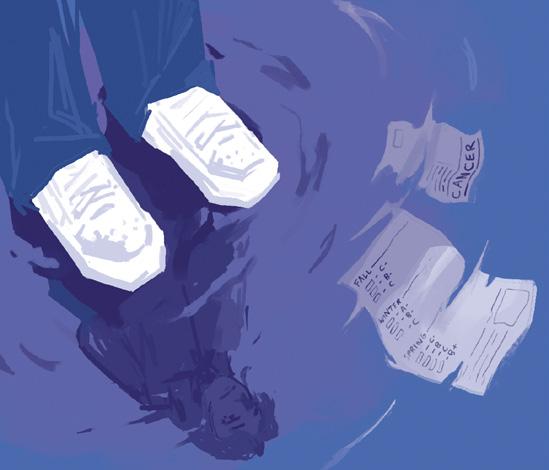
The Democratic Party needs to start fighting harder for our democracy and the people they represent
BY SABRINA FIGUEROA sfigueroaavila@ucdavis.edu
Te past two months have been marked by chaos and political rhetoric that sounds like it came straight from the 1940s. If you’re exhausted, anxious, angry or upset, chances are you are not the only one who feels that way. Sometimes, it feels like people like we — students and ordinary folk — are not in control of our own lives. When we feel this way, we often look to those who do have a good amount of control: politicians. For as long as nations have been documented, politicians and leaders have had both their good and their bad moments.

By “bad” moments, I mean that some of their actions and decisions end in prejudice, genocide, death or, in some cases, all of the above. Tese moments usually outweigh the good ones simply because they have graver consequences. Some argue that this is due to the inherent nature of being a politician — it’s impossible to make every citizen in a country happy. Even if that is the case, we shouldn’t be idolizing politicians as if we are their fans and they are our celebrities. Tey are people with a signifcant amount of power and, therefore, need to be held accountable for their actions.
understand the material.
We might not be arguing with the professor, but we have that same need to prove ourselves and our intelligence.
T is phenomenon isn’t restricted to university either; There’s an everyday pressure to prove our intelligence. Tink about when you’re talking with your friends and they bring up something you’ve never heard of. Many of us lie, saying, “Oh, I think I’ve heard of it,” and go along with the conversation without understanding the context. We participate in conversations without knowing what we’re talking about.
This phenomenon can be especially dangerous online. Not everyone is an expert in everything, yet everyone online acts like they are. People with very little understanding of an event or movement feel the need to pitch in and share their beliefs to appear knowledgeable to their followers — when, in reality, they’re only disrupting the conversation with their very limited perspective and, even worse, potentially spreading misinformation.
T e need to appear smart only harms us and prevents us from actually learning. Carol Dweck, an educational psychologist, explained how students who only care about appearing smart have a “fixed mindset.” T is makes them afraid of challenges, devastated by setbacks and less motivated to learn. The f xed mindset is in opposition to the “growth mindset,” in which students want to be challenged, are resilient in the face of setbacks and are more motivated to learn.
A crucial step to learning and
While President Donald Trump and other Republicans — who are tied to his fngers like puppets — work hard to rapidly establish executive orders and overturn Supreme Court cases to push their fascist agendas, where is the opposing side? Where is the party that supposedly stands for “fairness, justice and equality for all?” Without actually fghting for what they believe in, Democrats just give us empty words to hold on to — a false sense of security. Is this something that we, the people of the United States, should just accept in an era of turmoil? Te short answer is no.
Back in December 2024, South Korean President Yoon Suk Yeol declared martial law during a televised address. During a vote to reserve military rule, Yoon ordered the general of the military to block the ministers’ entry to parliament, many of whom belonged to opposing political parties. Tis action would have barred lawmakers from voting, making the order invalid. However, these politicians — many from South Korea’s Democratic Party — did not simply grovel in submission.
One Minister of Parliament, Ahn Gwiryeong, grabbed a soldier’s rife after
embracing the growth mindset is humility. Allow yourself to admit that you don’t know something, that you’re confused or that you need help. Only then do you open yourself up to learning for the sake of learning. So, I encourage you all to take down the “genius” facade. Admit your bad scores to your peers and you’ll f nd that you’re not alone in the trenches — or if your classmates did well, ask for some study tips! If your friend brings up something you don’t know about, ask them about it. If you’re interacting with a post online, do your own research on the topic before joining the conversation. T ere’s no need to prove yourself
it was pointed at her. Te opposition leader, Lee Jae-myung, live streamed himself jumping over a fence to get to parliament. Inside of the National Assembly building, they created a blockade so that soldiers would not be able to get in. It’s safe to say that, one way or another, these lawmakers were going to vote no matter what or who was standing in their way.
Comparing that to our United States Democratic Party, our party seems to not care as much as we think they do and defnitely not as much as we want them e Democratic Party has their issues, and it is uncertain whether they are the correct party to ght for the people of the U.S. But, if they are going to be the only opposition party with some kind of power, it’s time they start fghting tooth and nail too.
On Feb. 8, 2025, Democratic lawmakers were denied entry into the Department of Education. What was in their way? One man standing at a door and maybe three police ofcers. South Korea’s lawmakers fought with armed soldiers, but U.S. Democrats couldn’t stand to push aside four people. At some point, respectability politics get old; Tey may have worked before, but they haven’t worked for a long time and they aren’t working right now. If the Democratic Party thinks this is how they keep the people’s support, they should start to wonder if, maybe, this is why they are losing it instead. It doesn’t help that Democrats focus on sending “inspirational messages” during this time. As much as I value the importance of words and motivational speech, inspirational messages don’t work unless Democrats actually put action and deliberation into making them come true. All we have seen so far are hollow messages — whether in speeches or on random X posts — and we do not need any more. What we do need is to see their supposed frustration and anger manifest into action and turn into a chip on their shoulder. When alt-right fascist rhetoric threatens the values and the people you represent, a little punch where it hurts might not be the worst thing in the world.
Disclaimer: Te views and opinions expressed by individual columnists belong to the columnists alone and do not necessarily indicate the views and opinions held by Te California Aggie.
— we are all smart in so many diferent ways, and not knowing something is not a slight on your intelligence. In my opinion, the smartest people in the room are the ones who aren’t afraid of appearing unintelligent. When you’re brave enough to ask questions, you actually get answers.
Disclaimer: Te views and opinions expressed by individual columnists belong to the columnists alone and do not necessarily indicate the views and opinions held by Te California Aggie.
The buses are so wise
BY ALLISON KELEHER adkeleher@ucdavis.edu
After a long and grueling day on the UC Davis campus, with the sun having set many hours ago, I decided it was time to depart — my beautiful red chariot awaited me. As I stumbled over my own feet to the Silo bus terminal, I dreamt of the bed I was going home to. I boarded the bus and took a seat in the very back corner. Nestled underneath my backpack, I waited for the bus to take of into the night. With a loud squeak, the bus left the station to take me home. Tis bus and I embark on this journey every night, so I’ve started to understand its rhythm. Te braking and acceleration rocked me back and forth, like a little baby in a cradle. Tonight, I couldn’t fght the sleep that washed over me.
BAM. I woke up startled, in a random parking lot in the middle of nowhere. Farmland stretched out for miles in every direction. Te only thing I could see was a beautiful double-decker Unitrans bus. It looked like one of those vintage ones that they drag out for special occasions on campus.
Tis seemed like a one-way ticket to getting kidnapped, so I tried to look for a way out of the situation. Sadly, I heard animal noises coming from the farmland,
so that was not happening. I warily made my way over to the double-decker bus. As I got within fve feet of the bus, it sputtered to life and the lights turned on. Still creepy, but I pushed forward toward the bus. As I took a step onto the threshold, the bus groaned with my weight, making me feel a little awkward.
“Why are you bothering me at this hour,” a looming voice with a British accent said above me.
“Who said that?!” I asked in fear.
“I’m the Ghost of Unitrans Past,” the British voice boomed. “Something must be troubling you, otherwise I wouldn’t be here.”
Tis did indeed trouble me, because I had no idea what could be troubling me. I stewed for a minute before something
came to me: I had a conversation with my mom earlier today about whether UC Davis was the correct university to attend. I have been feeling homesick lately, and I’m worried that I made the wrong decision.
“Tat was not the wrong decision,” the British bus said, as if it could read my mind. “Look at how far you have come to be here. You have made so many friends and learned so much about yourself.” I nodded my head in agreement since he was trying to make me feel better, but it was still not making the sinking feeling go away.
“Do you remember that one time
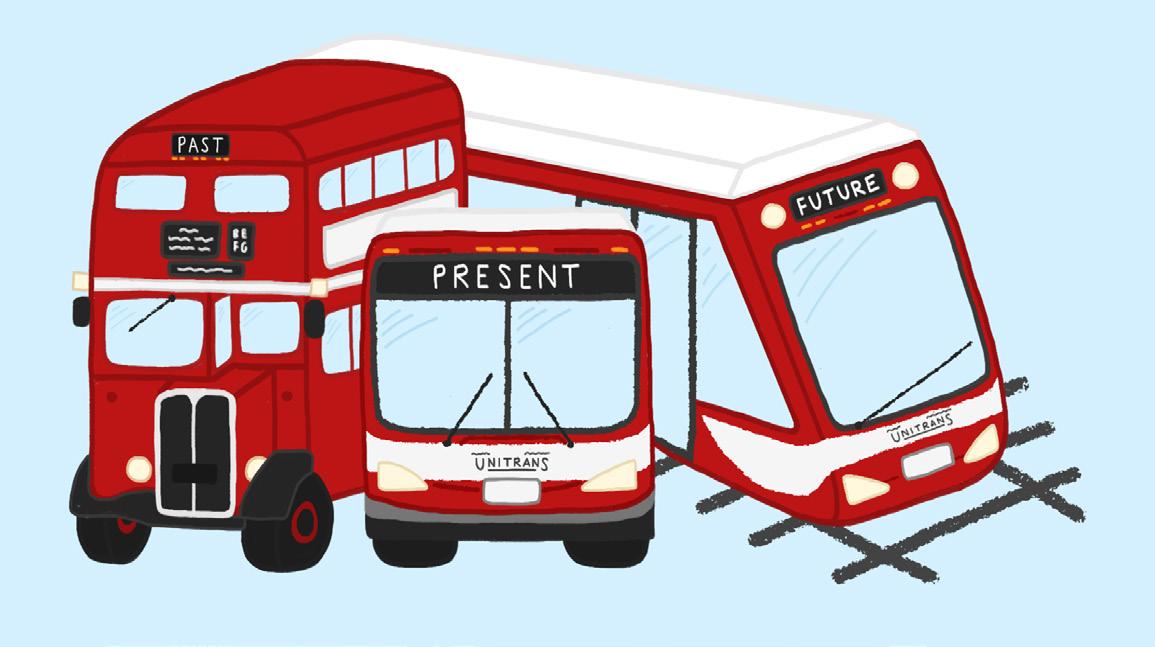
WRITTEN BY THE EDITORIAL BOARD
Te California Aggie has been serving the UC Davis campus and local community for 110 years. However, due to budget concerns, Te Aggie’s future in print is currently in jeopardy.
Print journalism is essential to a functional and thriving democracy, especially on the student level. While at glance this may feel less relevant in today’s digital world, the impact of print journalism has always been and remains timeless. Cutting Te Aggie’s budget would strip us of being a weekly newspaper and signifcantly downsize our journalistic eforts.
Originally founded in 1915, the newspaper is one of the oldest student publications in the state. While maintaining complete editorial independence, Te Aggie is a unit within the Associated Students of UC Davis (ASUCD) — receiving funding to manage our salaries and print operations.
Te UC Davis Campus Media Board unanimously approved Te Aggie’s proposed 2025-2026 budget on Feb. 28, but the ASUCD President informed paper leadership that the ASUCD is not planning on supporting Te Aggie’s full print eforts moving forward.
Troughout the last century, Te Aggie has been providing the student and city community essential news including but not limited to: campus and city news, features, opinion, arts and culture, sports, science and technology and multimedia. Remaining in print is essential to Te California Aggie’s service to the community.
Print journalism has a long and powerful history of keeping those in power accountable. As student press, our obligation is the same — to hold those in any ofce, from local and student government to campus administration, accountable. Tis is our journalistic duty and legal right, as defned by the First Amendment.
Difering from most colleges, Davis is a small town with a population of nearly 60,000 residents. We don’t have newspapers like Te New York Times or Te Los Angeles Times to compete with; While serving as a student newspaper, Te California Aggie also functions as a local paper — providing substantial coverage to city and county communities at large. Our print presence is essential to the local community and only further strengthens our credibility and relationship with our readers.
By providing the student and local community a free physical product, we not only inform students of the

only journalism opportunity at UC Davis, we assure them we are there to bring them accessible, reliable and quality journalism.
Te Aggie is also continuously working to improve our digital and online presence. It’s worth pointing out that having a printed paper is the best form of advertisement and means to increase our digital presence. In order to have a large online readership, we need a print product to coincide with it.
Tere are several legitimate reasons for why Te California Aggie should remain weekly in print, but none are as important as the simple fact that journalism is a public and physical service for the community.
First and foremost, Te California Aggie does not want to stay in print in order to boost resumes, brag about our stories or to make advertising revenue — Te California Aggie wants to stay in print in order to continue serving you, the reader. Regardless if you are a student, professor, community member, business owner, activist or all of the above — Te Aggie is a service for you. Tis has been our priority for the last 110 years, and this will be our priority for years to come.
Signed in solidarity by the editorial boards of:


Editorial Board
CHRIS PONCE Editor-in-Chief
ALYSSA CREVOISERAT Managing Editor
MADISON PETERS Campus News Editor
HANNAH SCHRADER City News Editor
MAYA KORNYEYEVA Opinion Editor
ZOEY MORTAZAVI Features Editor
ANA BACH Arts & Culture Editor
MEGAN JOSEPH Sports Editor
KATIE HELLMAN Science Editor
JENNA LEE Photo Director
ARIANA NOBLE Layout Director
LANHUI ZHEN Design Director
JOANNE SUN Social Media Manager
AARON POTTER Website Manager
CASSIDY GILLIS Distribution & Outreach Director
TIFFANY HE Copy Chief
JENNY DYE Copy Chief
SAMUEL RUIZ Translation Director
ILEANA MERAZ Translation Director
LAURIE PEDERSON Business Development Manager
The California Aggie needs your support:
WRITTEN BY THE EDITORIAL BOARD
As budget hearings approach, The Aggie is concerned about potentially severe cuts to our budget desks — would be less accessible to the student body. Let us be clear: A decision to remove Te Aggie from lecture halls, campus buildings and downtown businesses would be a direct act of censorship on our organization.
As our readers know, Te California Aggie is the independent, student-run newspaper at UC Davis. Te paper’s primary role is to provide an accurate, fair news resource for the campus and local community as a whole. Without the university providing a journalism program, Te Aggie’s presence is also the only opportunity for students to gain hands-on experience in professional journalism.
Our talented staf of over 100 students — including writers, designers, photographers and layout artists — work on tight deadlines to create a weekly print product for the UC Davis campus, Downtown Davis and local businesses. At the time of publication, the paper is held in Te Avid Reader, Newsbeat, Pachamama, Philz Cofee and Temple Cofee Roasters, as well as 30+ other racks within the city and campus.
However, our ability to provide quality, unbiased journalism is currently hanging in the balance amid pending Associated Students of UC Davis (ASUCD) budget hearings. While Te Aggie maintains editorial independence, our operations are largely funded by the ASUCD Senate.
Fill out our form about why print is essential to The Aggie!
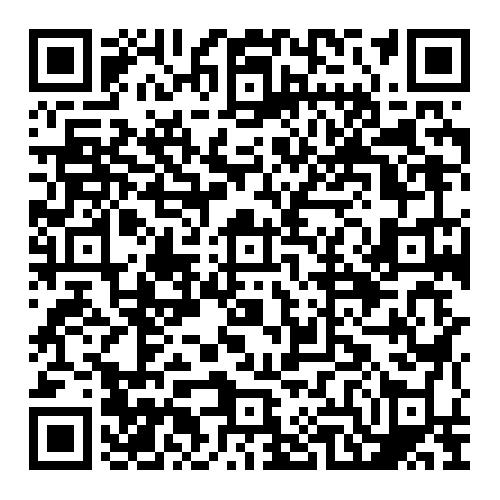
ASUCD Senate and budget: Te Senate is the student body government at UC Davis that manages an over $20 million operational budget — from Unitrans to Te Pantry to Te Aggie, ASUCD funds major campus operations.
While this isn’t often discussed, this money is provided by you — the students — through quarterly fees. ASUCD has a historically low voter turnout, with the most recent election receiving roughly 7-9% of the student vote. Over the last few years, ASUCD received as little as 800 to a few thousand votes out of a student population of 40,000.
Te future of Te California
Aggie’s print budget will come down to negotiations between us, the Senate and Campus Media Board in the next couple of weeks. In a recent meeting between paper leadership and the Media Board, Te Aggie’s proposed budget was unanimously approved — a requirement in order to proceed to budget hearings.
Trough conversations with the ASUCD President and Senate, it has become clear that there is resistance in supporting Te Aggie’s print eforts moving forward. In the ASUCD President’s proposed budget for Te Aggie, there is no budget line dedicated to printing costs, instead printing is included under “Supplies and Materials” along with other essential services. Tis proposal would efectively change our print model, pending other changes proposed by the Senate. Te Aggie’s proposed 2025-2026 budget is lower than the year prior, excluding ASUCD’s minimum wage increase that was originally passed through emergency legislation. However, we expected challenges to our budget, which is why the proposal includes a trim to our printing costs and projected advertising income. However, the obstacles we are facing moving forward seem less concerned with our print and more concerned about what we are printing.
Troughout the last year in public Senate meetings, it has become clear that there is disapproval of our content:
From editorials to news reporting, some senators’ opposition to our paper has been made abundantly clear. We are concerned that these critiques are not with our advertising but with our reporting on Senate meetings. In order to continue our reporting and maximize our readership, Te Aggie requests that “Printing Costs” be added back to the 2025-2026 budget.
Print journalism: We cannot stress enough the importance of providing a physical print product for the Davis community. Not only is Te Aggie’s presence in print necessary to ensure accessibility to the university’s 40,000 students — some of whom may not have access to our digital platform — it is also fundamental to our ability to promote our paper to students interested in journalism and local businesses interested in advertising opportunities.
Additionally, print journalism directly supports local businesses and holds individuals and organizations accountable — without print, Te Aggie’s visibility, accessibility and impact would be drastically reduced.
Te California Aggie is the only true bridge between what occurs in student government meetings and the public, and we are the only watchdogs available to hold elected ofcials accountable for $20 million in student fees.
Senate meetings are held weekly in the Mee Room of the Memorial Union (MU) on Tursdays. While the room is decently sized, it can only ft roughly 20 to 30 chairs for student attendees. Additionally, the Senate does not have microphones or adequate sound projection, making it inaccessible for many who attend. Te Aggie requested microphones last November to ensure accuracy of quoting the Senate table and commenters, but the request has not been addressed. Moreover, the meetings are made available with Zoom but often last several hours into the night, making our coverage even more essential to the average student.
If we are to see severe cuts to our print operations, our reporting on the Senate — as well as our six other
Additionally, substantially cutting our print budget would force Te Aggie to restructure a signifcant portion of our staf’s roles. For positions such as the layout director, layout artists and outreach and distribution manager, the primary component of their role is to work with our weekly print product. For a governing body that stresses the importance of supporting ASUCD jobs and boasts about the number of students it hires, this decision would be strange at best and directly harmful at worst.
Trough conversations during Te Aggie’s Quarterly Report a few weeks ago and the Media Board meeting, it’s clear that the grounds for cutting our print budget are baseless. Criticisms that lack quantitative evidence are being weaponized against Te Aggie’s proposed printing budget line; Tese claims are based on speculation and not fact, and there is no willingness on behalf of the governing body, as of now, to present evidence or data to support their claims. When paper leadership requested evidence to support the reasoning behind a proposed change to Te Aggie’s print budget, the response was that quantitative evidence was unnecessary, instead personal anecdotes were presented as the only requirement to make signifcant cuts to our organization. Te decision to present unsubstantiated claims instead of backed-up reasoning lacks respect and ignores the oath taken to support the student body’s access to vital services.
Support Te Aggie: Our priority is not to bring in money to the ASUCD as a commercial unit, it is to provide fair and quality journalism to the campus and local community. Journalism is not intended to be a money-making resource for the student government
but instead a service that informs the public and benefts the local community as a whole.
Decisions made that fundamentally restructure and defund an organization should not be based on interpersonal relations between ASUCD units and the student government but should be focused on the individuals directly impacted: the students. Tis paper is by students and for students, and to cut Te Aggie’s funding would not only be harmful, it would be unjust.
Taking even a simple glance at our community demonstrates our impact on the lives of Davis residents and students — from clippings of campus organizations in the MU to our yearly Best of Davis issue hung on downtown windows, our impact is everywhere. We do not have full certainty of the results of Saturday’s budget hearing, but we believe that there is validity and grounds for concern.
But, senators, please prove us wrong. Show us, and the readers, that you will put editorial concerns aside and support the only independent student paper in the city. Support our right to freedom of the press and uplift community voices by keeping us in print. As we see increasing press restrictions in our country — both on the national and student level — choose to be an outlier and support accountability and transparency.
Te Aggie has been the longeststanding student paper in Davis since 1915, and the Editorial Board requests that our readers, UC Davis students and community members come together in support of Te Aggie’s continuation as a vital service and resource. Students, contact your elected ASUCD Senators to support our print eforts and submit a response directly to Te California Aggie in our Google Form. Te Aggie has been a free-of-cost service for the student body for over a century, and its continued role in the community needs your support and protection.
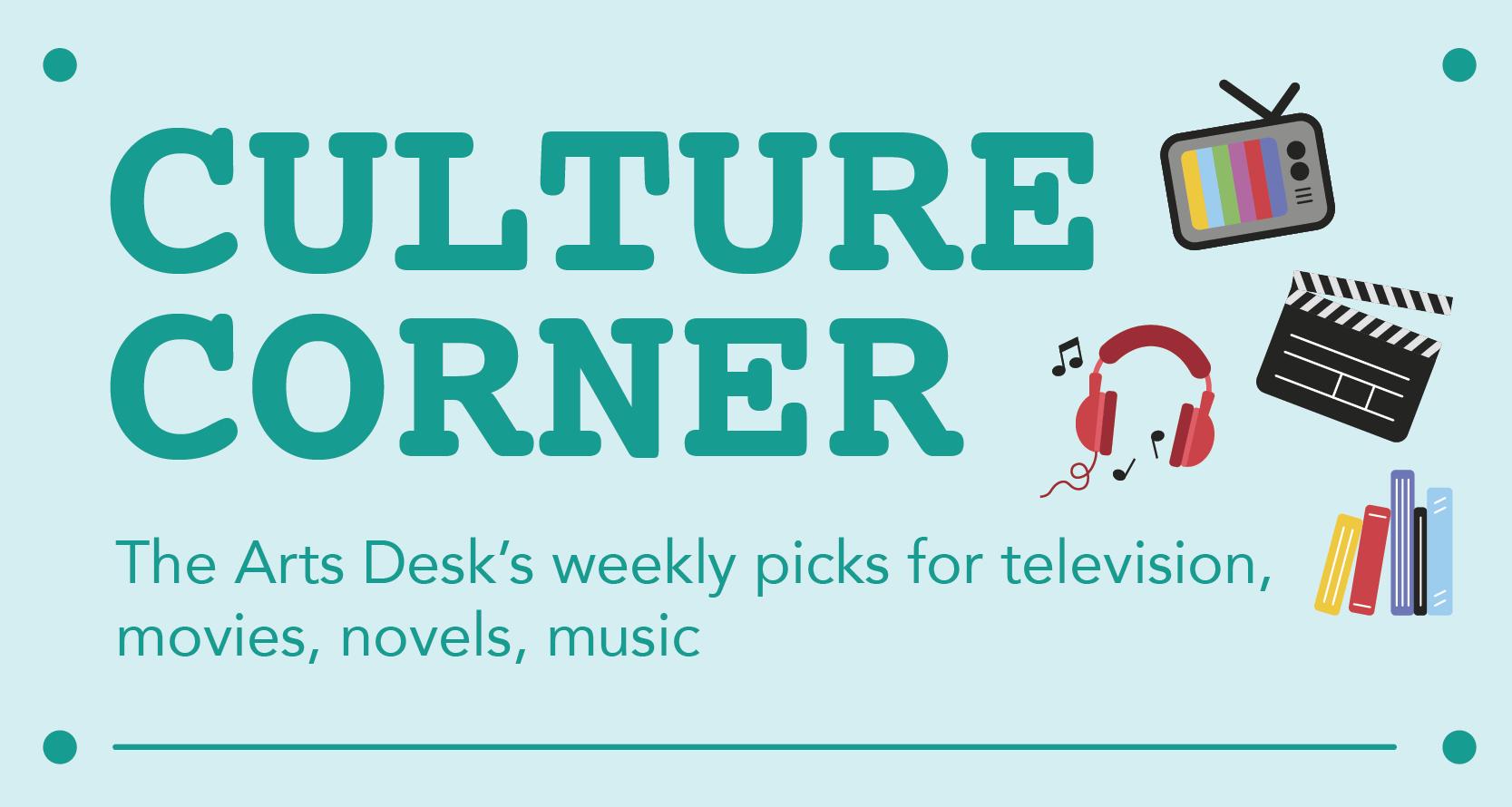
BY NATALIE SALTER arts@theaggie.org




Album: “Windswept Adan” by Ichiko Aoba (2020)
If you have ever wondered what the musical equivalent of soft ocean waves, a quiet breeze through leaves or the soft twittering of birds in the morning is, you need not look further than Ichiko Aoba’s masterful “Windswept Adan.” An ethereal, dreamy LP flled with diaphanous melodies and gentle vocals, Aoba’s artistry is so absolutely transcendent that you’ll feel like you’re foating through the clouds from the start of the album to its end. When the world gets a little too loud, put on “Windswept Adan” and drift away to the peaceful, enchanting world Aoba so masterfully creates. It’s unlike anything else you will ever listen to, and its soothing efects are nothing short of magical.
Book: “Days at the Morisaki Bookshop” by Satoshi Yagisawa (2023)
Takako is at rock bottom. Her long-term boyfriend casually reveals he’s been seeing someone else and leaves her, she loses her job and she’s spiraling into a deep depression, leaving her unable to get out of bed. However, a curious ofer from her eccentric uncle — to come live with him in the bookstore district of Jimbocho, Tokyo and help run his quirky used book shop — gives her a new opportunity to embrace life. In a truly beautiful turn of events, Takako learns the importance of slowing down and appreciating life’s little gifts, fnally able to embrace the love of her family and friends once more. It’s a tremendously heartwarming novel that will remind you of the power of little gestures of kindness and the healing power of a good book.
Song: “1980s Horror Film II” by Wallows (2020)
“She was only seventeen / Oh, why are girls in songs always seventeen?” is one lyric Wallows member Braeden Lemasters sings right at the start of “1980s Horror Film II.” Tat’s a great question to start a song on, and the band only continues this wry tone throughout a musical chronicle of a not-so-perfect love story with a dream girl straight out of a coming-of-age flm. It’s a nostalgic, synth-backdropped track that sounds like it was pulled out of the titular decade, with an amusing lyrical narrative to match. Too bad that the song’s muse reveals at the end that she’s “really not that into guys.” Better luck next time — in the meantime, I’ll be listening to this song on repeat.
Movie: “Almost Famous” dir. Cameron Crowe (2000)
When 15-year-old student prodigy William Miller (Patrick Fugit) seizes an opportunity to pursue music journalism, he doesn’t quite expect to fnd himself on a bus with rising-star band Stillwater on a cross-country tour. Tere’s a Rolling Stone assignment weighing on his shoulders, the band is hardly ever sober enough to give a proper interview and self-proclaimed teen muse Penny Lane (Kate Hudson) is becoming an unexpected object of his afections — it’s a lot for one high schooler to handle. Still, despite its chaos, “Almost Famous” is also a comedic and heartwarming tale — with, of course, a very memorable soundtrack as well.
The student-run theater group brought the Broadway show to UC Davis students and local community
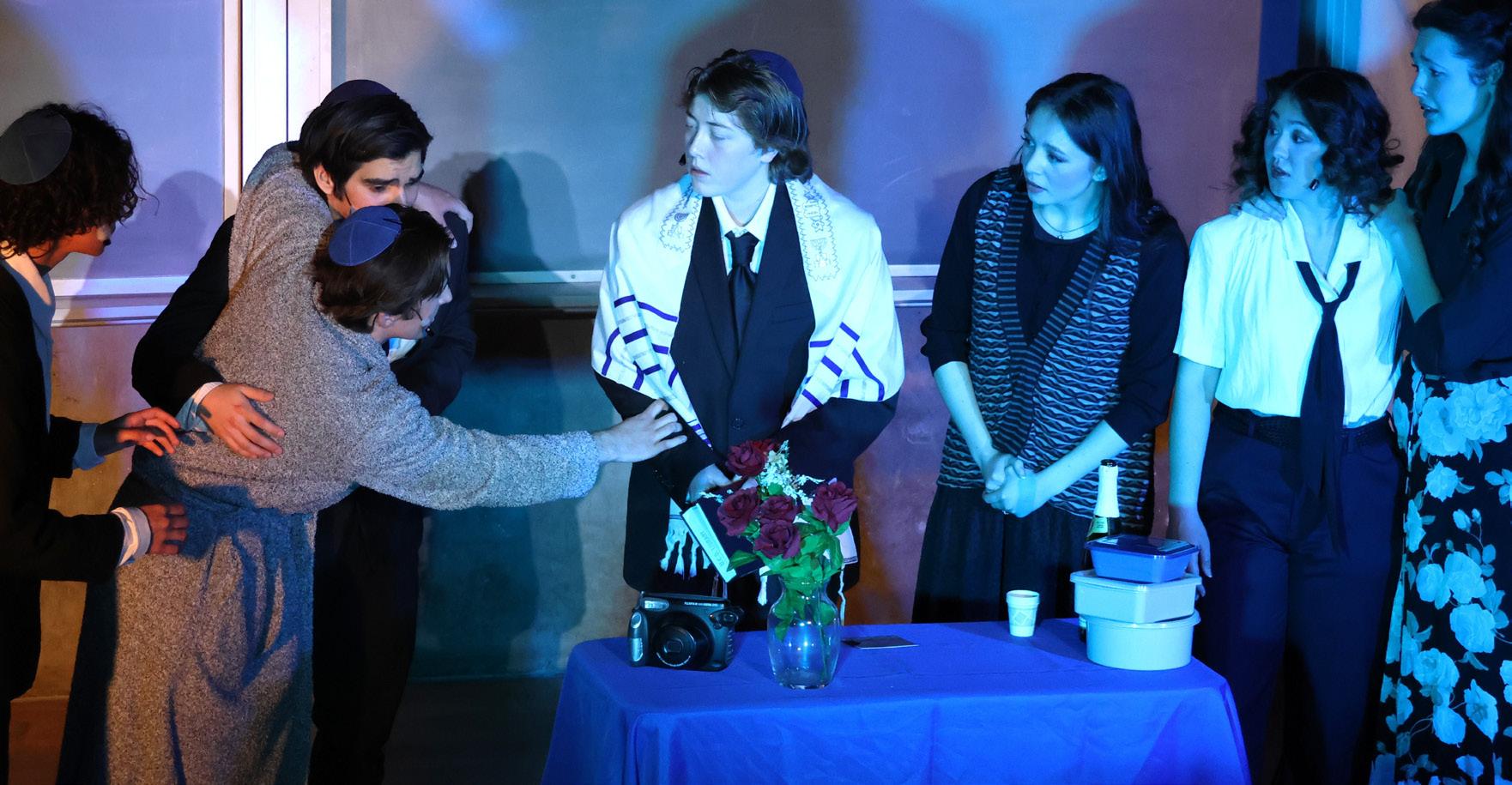
BY SHREYA KUMAR arts@theaggie.org
From Feb. 28 to Mar. 2, the UC Davis student theater group, Studio 301, rose to the challenge, delivering the Broadway original production of “Falsettos” with humor, heartbreak and a whole lot of heart.
Under the direction of Isabella Ku, a fourth-year animal science major, the talented cast and creative team brought the show’s intricate score and complex characters to life in a way that left the audience spellbound each night.
“Falsettos” opened on Broadway in 1992, earning rave reviews and seven Tony Award nominations, taking home the award for “Best Original Score.”
It gained even more recognition and popularity after the 2016 revival, starring Christian Borle, Andrew Rannells and Stephanie J. Block. Set
in the late 1970s and early 1980s, “Falsettos” follows a family that falls apart when the father, Marvin, divorces his wife, Trina, to be with his male lover, Whizzer. As Marvin and Trina attempt to maintain a sense of normalcy for their son, Jason, the dynamics of their unconventional family become increasingly complicated as they have to face more and more obstacles together.
Te musical’s frst act is flled with sharp humor and rapid-fre dialogue, while the second act takes a more somber and introspective turn as the family tries to come together to prepare Jason’s bar mitzvah with the acquired immunodefciency syndrome (AIDS) crisis looming in the background. Troughout it all, the show explores the complexities of love, acceptance and the work that goes into building a family.
At the time of its release, the way the play tackled the prominent themes of Jewish heritage, gender roles, LGBTQ+ identity and the impact of the AIDS
Researchers at the UC Davis Institute of Psychedelics and Neurotherapeutics have finished the total synthesis of a scarce, naturally found anti-addiction/ antidepressant agent
BY NAREN KRISHNA JEGAN science@theaggie.org
Ibogaine, a psychoactive compound derived from African plants like the iboga shrub (Tabernanthe iboga) and the small-fruited voacanga tree (Voacanga africana), has long been recognized for its potential in treating addiction and depression.
However, its natural scarcity and association with cardiac risks have limited its medical applications. In a groundbreaking study published in “Nature Chemistry,” researchers at UC Davis’ Institute for Psychedelics and Neurotherapeutics (IPN) have successfully synthesized ibogaine and its analogues from pyridine, a widely available and inexpensive chemical.
Led by Rishab Iyer, who received a Ph.D. from UC Davis in 2023, and Professor David E. Olson, the team developed a strategy to create ibogaine-related alkaloids with significantly improved efficiency. Previous synthesis attempts faced low yields and complex chemical pathways, but this new method produces ibogaine analogues in just six to seven steps, with yields ranging from 6 to 29%. Tis advancement allows for large-scale production without depleting natural plant resources and opens new doors for medicinal chemistry and organic synthesis research.
Organic synthesis is the process of constructing complex molecules from simpler chemical building blocks. In total synthesis, chemists design step-bystep methods to create natural products like ibogaine from non-natural sources.
“Accessing sufcient quantities of natural ibogaine for clinical trials has proven challenging as it is produced in small quantities, and overharvesting of T. iboga negatively impacts cultures that use it for spiritual purposes,” the study reads.
Using organic synthesis techniques, these problems can be avoided in a clever manner.
“[Using] semi-synthesis from the more abundant natural product voacangine ofers a potential solution, as does efcient total synthesis from readily available building blocks,” the study reads.
One of the biggest challenges to consider in the production of ibogaine is the compound’s unique and complex structure. Imagine trying to build a
puzzle where certain pieces must ft together in a specifc way. Scientists overcame this by using a series of chemical reactions, including one where they “snap” diferent pieces of the molecule together in a controlled way. Teir new approach uses key steps such as regioselective reduction, a DielsAlder cycloaddition and epimerization to build the molecule efciently.
Ibogaine’s potential as a treatment for substance use disorders, traumatic brain injuries and neuropsychiatric diseases is gaining traction, despite its risk of causing irregular heartbeats. Olson’s team sought to understand how ibogaine interacts with biological systems by studying its molecular structure and testing analogues.
One key discovery was that only the natural form of ibogaine, not its mirror image, promoted neuronal growth, indicating a specifc receptor interaction.
“Nature only produces one version and if the therapeutic efects of ibogaine are coming from interactions with another chiral entity, like an enzyme or receptor, then you would expect only the natural version to have an efect,” Olson said. “If it’s non-specifc, then both compounds would produce an efect.”
Another notable analogue, (-)-10-fuoroibogamine, demonstrated strong efects on neuronal growth and serotonin transporters, which play a crucial role in depression treatment. This analogue exhibited rewiring of the brain in a way that supports addiction recovery and mental health improvement.
Olson emphasized the need for an “Ibogaine 2.0” — a safer alternative that retains the compound’s therapeutic benefts without cardiac risks. By making ibogaine analogues more accessible and studying their biological mechanisms, researchers aim to develop nextgeneration treatments for addiction and mental health disorders.
This research’s importance also lies in its ability to make ibogaine more accessible for scientifc studies and medical use while avoiding environmental harm. More importantly, it lays the foundation for developing safer treatments for addiction and mental health conditions. Te ability to create modifed versions of ibogaine with improved safety profles could revolutionize treatment options for patients worldwide.

and practices in preparation for the production.
“As someone who is also Jewish, I felt like it was really important to make sure everything was done right and with care and respect,” Zylberman said. “I applaud the Studio 301 team for giving us the space to be heard and for being so committed to authenticity.”
Josh Velazquez, a fourth-year statistics major who portrayed the male lead, discussed the process of ensuring the production’s authenticity and accuracy.
crisis made it truly groundbreaking. On top of that, the story portrays a family that practices Reform Judaism, a branch of Judaism that was still developing and shifting at the time of its writing. With so many complex themes, “Falsettos” is an ambitious choice for any theater organization.
“In this political climate, I think it’s especially important to represent queer and Jewish culture in the art,” Ku said. “I didn’t foresee this [political climate] when I submitted the idea to do this musical, but I think it’s especially meaningful now, and I hope it resonates with the audience.”
Due to the complex content in the story, the cast and crew took every step to make sure they were being as accurate and faithful in their depiction of the characters as possible. Adira Zylberman, a frst-year undeclared major and a choreographer for Studio 301, gave a presentation to the organization to educate them on Jewish culture
“We did a lot of listening, a lot of understanding, a lot of talking about Jewish history and that helped us to understand the characters better, ” Velazquez said. What made this production of “Falsettos” truly special was the resourcefulness and passion of the entire Studio 301 team. Tis quarter’s production took place in Social Science 1100 lecture hall, a venue signifcantly smaller than a traditional theater stage. Despite the space limitations, the crew maximized every inch, transforming the lecture hall into an immersive environment.
Te stage design featured minimal but strategic set pieces, allowing the actors to transition fuidly between scenes while keeping the focus on their performances. Cast members frequently engaged with the audience by entering the seats or walking through the aisles, adding a layer of intimacy to the production that made the emotional
beats hit harder. The professional sound design and lighting contributed to the theatrical experience, further elevating the production’s quality into a professional, immersive experience.
“I like to say since we’re on a student-run team, we’re also on a student-run budget,” Ku said. “We rely heavily on donations and ticket sales, and the majority of our budget went into getting the rights for ‘Falsettos’ alone. We actually got a lot of help from the Aggie Reuse Store, which helped us to get a majority of the clothes we used in costuming for free. We also traditionally perform in lecture halls to save on costs, but I think we’re getting the hang of it.”
Te actors put on soulful, relatable performances that had the audience laughing out loud one minute and tearing up the next, signifying that Studio 301 had successfully brought “Falsettos” to life in a way that resonated deeply with its viewers.
With its heartfelt performances, inventive staging and professionalcaliber technical execution, this production was certainly a testament to the dedication, talent and passion of everyone involved in making it happen. If you missed “Falsettos” but want to support Studio 301, follow their Instagram account, @ studio301productions, or visit their website to get involved or to learn more information about their upcoming productions.
The entirely volunteer-based event offers various crafts, vintage clothes and jewelry to community members at Central Park
BY RACHEL GAUER features@theaggie.org
On two Sundays of every month, the fresh produce, bread and cheese booths that typically populate the Davis Farmers Market in Central Park are replaced by an array of handmade goods, vintage clothing and jewelry.
Te Davis Craft and Vintage Fair has become Davis shopping staple, allowing local businesses and vendors to collectively sell their specialized goods in a prime location downtown. Items that are frequently on sale at the event range from handcrafted journals and notebooks to carefully curated vintage clothing pieces. Accompanied by alternating local bands and a food truck, the craft fair ofers a unique market for any shopper looking for a Sunday stroll.
Debra Ariola is the director of the Davis Craft and Vintage Fair and the owner of Recollections Vintage & PreLoved Items, a business reselling vintage jewelry at the fair. Ariola, who has lived in town since the 1970s and is a UC Davis alumna, highlighted the appeal of Davis that draws vendors to participate in the fair.
“We have amazing volunteers that come from as far as Auburn and they are committed to our community,” Ariola said. “It’s amazing how charmed people are by Davis and how much we are a great community that people want to be a part of.”
The events originally began in 2012 as Square Tomatoes Craft Fair and ofered exclusively crafted goods. Tough the quirky name was certainly memorable, Ariola said it brought both some confusion and limited the oferings to only handmade goods.
“Many people came looking for tomatoes: We thought we either would have to start crafting tomatoes -– square ones — so we can say, ‘Tere they are,’
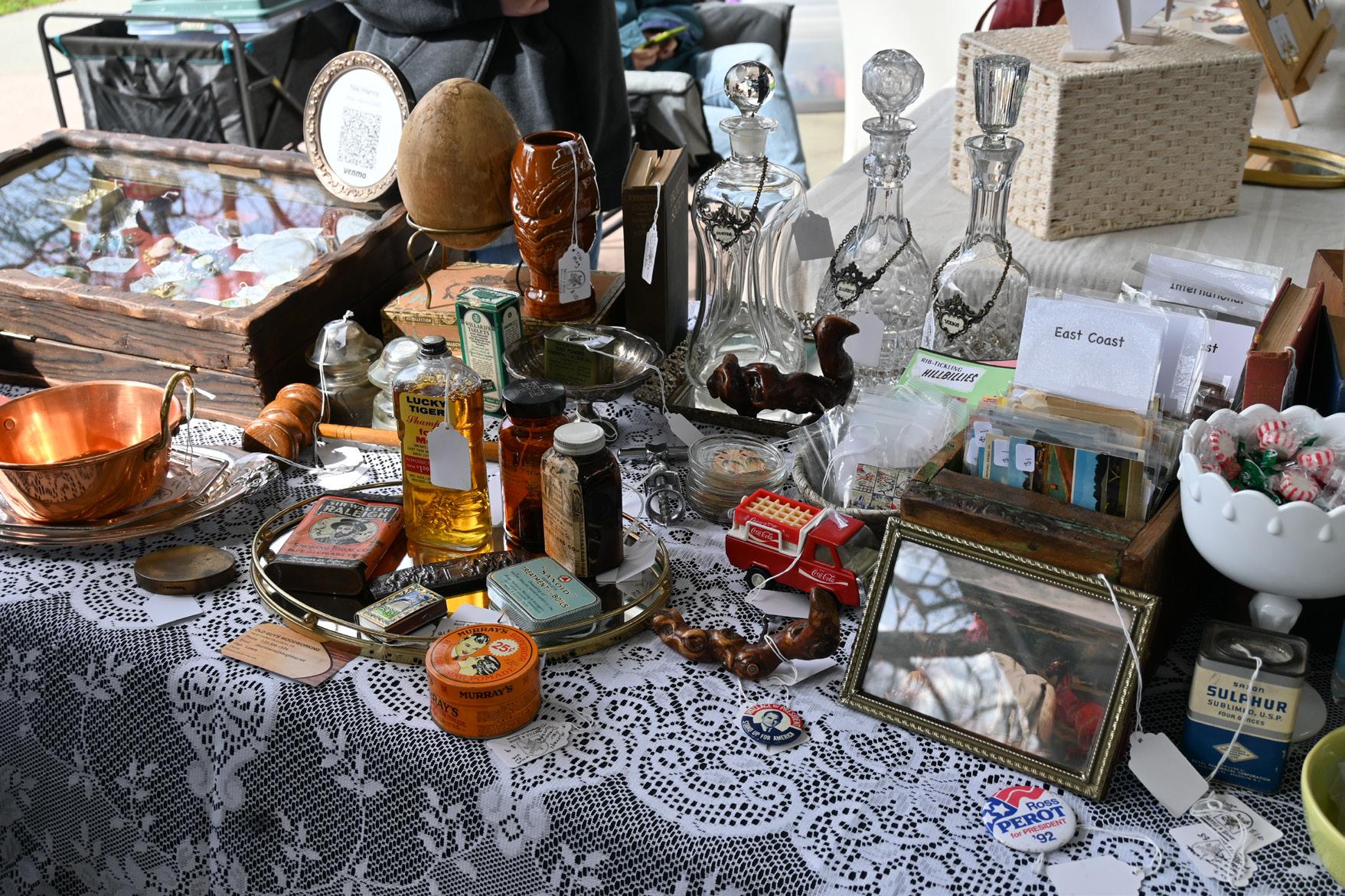
or we could change the name,” Ariola said. “We decided to change it to Davis Craft and Vintage Fair to be very clear about what we are and who we are.” Ariola highlighted that the event is organized entirely by volunteers — vendors who choose to volunteer have greater priority in securing a competitive spot for a booth. “As a director who is also a vendor it has been very important to me to have this group of volunteers,” Ariola said. “It has made the fair and grown the fair so much from what I can do just by myself — I have a great group of people who are totally committed to keeping this fair going.”
The fair’s team of about 30 volunteers do everything from local advertising to running their various social media pages. Emily Avalos and her husband are part of the team, installing lawn signs to advertise the event around town.
Avalos is the owner of Emily’s Crochet Corner and began selling her handmade crocheted plushies at the Craft and Vintage Fair in 2023. She said that the fair has ofered her a sense of belonging and community unique to Davis.
“I knew that Davis was a community-based town, but once we started doing the craft fair, I found
Intramural sports provide a way to stay connected to beloved sports or discover new ones
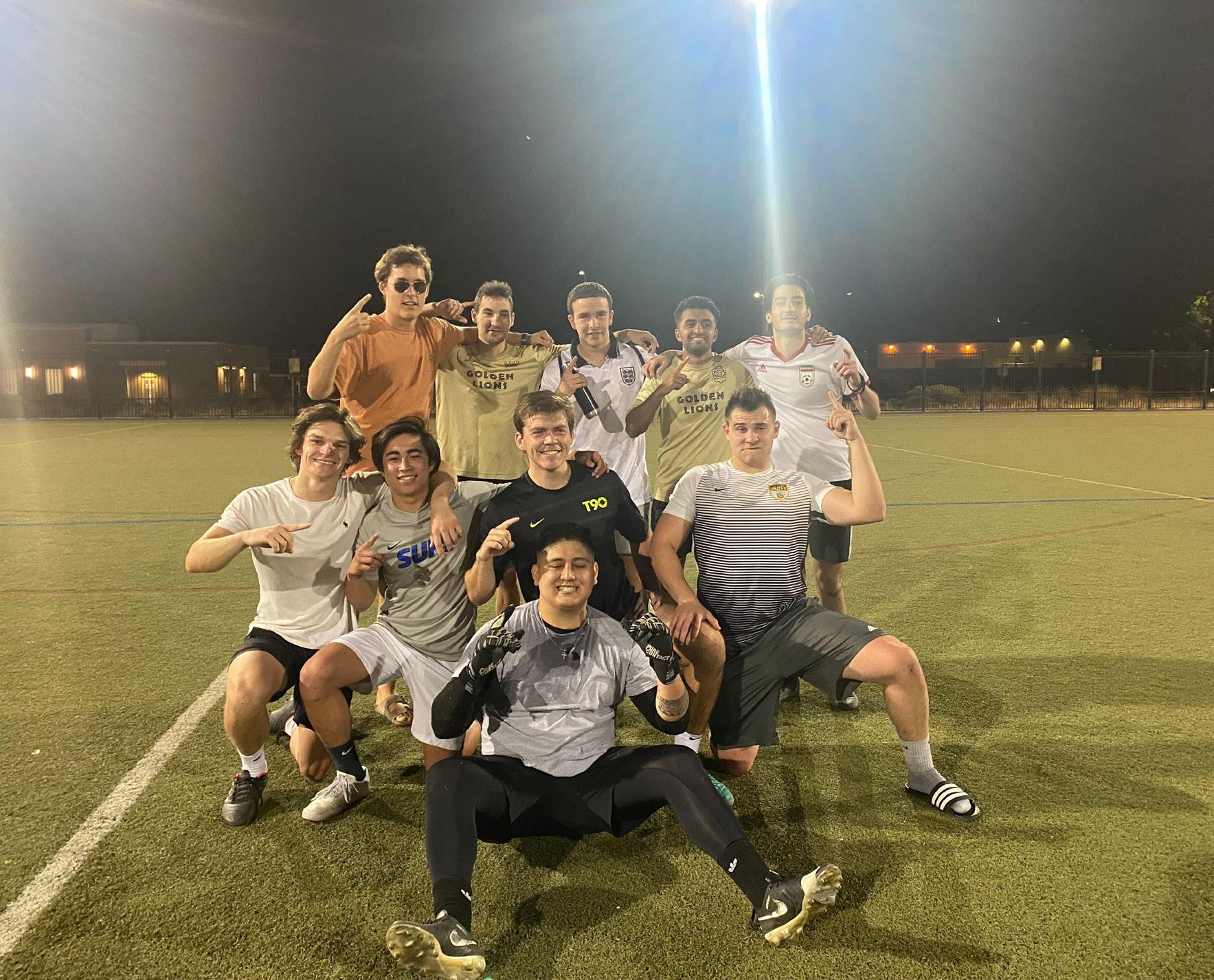
Sports are a fundamental part of many students’ high school experiences. They build a sense of community and lay the foundation for learning important teamwork skills. Despite these benefts, many students fnd it difcult to continue playing the sport they love once reaching college. Hard classes, busy schedules and work duties make a long-term commitment to sports unfeasible, forcing many to stop playing altogether.
Trough the Campus Recreation department, UC Davis recreational sports provide students and staff with access to over 30 diferent sports including fag football, indoor and outdoor volleyball and even innertube water polo. Rec sports provide an opportunity for students to continue their favorite sports or try new ones, all in a low-commitment setting that aligns with the busy and variable schedules of college students.
For John Patrick Walker, a fourthyear environmental policy analysis and planning and Spanish double major, this fexibility has been crucial.
“Te nice thing about rec sports is that you can show up fve minutes before the game starts with your cleats and just hit the feld and have some fun,” Walker said. “We’re busy, we’re students. We have school and work and whatnot, but to take that hour out of my day every Tuesday at 7:30 p.m., to go play the sport that I wouldn’t normally fnd myself in, was and still is a valuable experience.”
Walker has participated in several rec sports in his time at UC Davis, including basketball, soccer, volleyball and softball. Trough this involvement, he has made memories and connections that will last beyond his college years.
“I’ve played a lot of rec sports in my four years here,” Walker said. “What better way to boost my mental health, boost my physical health and make friends doing the thing I love?”
In addition to playing intramural sports, Walker continued his involvement by working as a referee for his peers’ games, something which he asserts has supported his desire to get more involved in rec sports while helping others explore the program.
“I applied to be a ref after participating in rec sports,” Walker said.
“It brought me campus connections and brought me participation in my community beyond the sport. I got to help other people fnd that same value that I found in rec sports.”
For other students like Salina Kamburova, a fourth-year managerial economics major, rec sports has provided a way to reconnect with old favorites while maintaining a busy schedule with work and school.
“I’ve loved participating in a sport, especially because it’s with a group of friends I don’t see outside of volleyball, so it’s nice to catch up with them,” Kamburova said. “Playing has helped me stay connected to a sport I played for [over] seven years but don’t have the time or interest to pursue as a career.”
Kamburova also said that rec sports have given her a way to stay connected to friends throughout her four years of undergraduate education even with
changing schedules and priorities.
“I’ve played intramural volleyball all four years at college,” Kamburova said.
“I used to play volleyball with random groups of people at the [Activities and Recreation Center] (ARC) freshman year and found out they were making teams, so I initiated a team of my own. I’ve been playing with those same people since then.”
Paige Benson, a UC Davis alumna, also took advantage of what intramural sports had to ofer during her time as an undergraduate student.
“I participated in intramural beach volleyball, inner-tube water polo and soccer,” Benson said. “I got involved because I heard about all the various options and wanted to fnd another fun way to spend time with friends.”
Benson also believes that rec sports provide access to activities that are sometimes unfeasible to coordinate outside of intramural sports.
“Participating in sports in college is such a unique experience and resource that should defnitely be taken advantage of,” Benson said. “Having access to sports felds and equipment on campus is an amazing beneft of college. It’s also a great way to meet new people, reconnect with old sports interests or spark new ones.”
As the weather gets warmer, recreational sports will continue to offer a forum for students to stay active and connected. New leagues and tournaments are announced on a quarterly basis through the Campus Recreation page, where students can explore team options or sign up to compete.
the artists to sell their work.
Kim Nguyen, the director of Couleurs Vives, explained the intention behind this unique experience for the artists.
“It’s an opportunity for them to be a part of their community and not feel a stigma,” Nguyen said. “My goal is for these artists to come and showcase their talent and learn to communicate with the people in the community.”
Nguyen, who began partnering with the fair in 2018, emphasized that the work sold at the booth and any donations made go directly to studio space. T e proceeds go to the artists themselves, and the money we raise covers the expenses that go into the studio –– the supplies, the rent, everything,” Nguyen said. “Te [artists] come to work at the studio and it is all free for them.”
that not only are all of the people who are part of putting on the event are extremely kind and welcoming, but also the community has been really great, especially all of the college students,” Avalos said. “It’s always lots of fun to see people come in and get excited about the things in my booth and I start recognizing regular customers and build a rapport with them.” Te fair also partners with local non-proft Couleurs Vives Art Studio & Gallery, a Davis organization that ofers art classes to neurodivergent adults at their downtown studio. In addition to being a key sponsor, Couleurs Vives also ofers a booth at the fair to allow
Outside of the Sunday events, Nguyen explained that Couleurs Vives and the Craft and Vintage Fair work to mutually beneft each other: Te organization assists fnancially to host the fairs and vendors volunteer to teach classes at the studio. Te vendors teach at our studio and encourage the artists to be touched on their creative side,” Nguyen said. “It’s good for the vendors to have an understanding of these special artists and how they think and that they are capable of being creative and successful at doing what they do — they learn about people who are neurodivergent and the neurodivergent learn from them.”
The Davis Craft and Vintage Fair hosts the event twice a month on Sundays from 9 a.m. to 4 p.m. at Central Park in Downtown Davis. For more information on regular vendors and the fair’s history, visit the Craft and Vintage Fair’s website.
Students advise cat owners on tips to keep their pets happy and healthy
Cats owners can take action to keep their pets safe, mentally stimulated and in good health
BY AMBER WARNKE features@theaggie.org
Humans have lived alongside cats for thousands of years, sharing their homes with the creatures all over the world. Cat owners today face infuence from the spotlight placed on pets through social media creators, prompting a greater discussion of the best way to raise the animals. Dove Tapia, a third-year wildlife, fsh and conservation biology major and the treasurer of the UC Davis Veterinary Aide Club, suggested that owners give their cats fea- and tickprevention medication monthly — even if they are indoors, as bugs can still get inside. She also provided tips on cats’ water-drinking habits and how to best encourage a cat to drink water.
“For one, cats are not used to having their water next to their food, so having their water next to their food can be a little bit of a deterrent for them,” Tapia said. “Tey [also] want [their water] to be moving, so that’s why a lot of people have those fountains.”
Tapia discussed the importance of dental care in cats.
“Get them used to brushing their teeth because dental bills are so expensive,” Tapia said. “You want to make sure that you can avoid them losing their teeth and get them okay with a toothbrush or some sort of dental treat.”
Alyssa Arino, a second-year graduate student in UC Davis’ School of Veterinary Medicine, is one of the presidents of the Orphan Kitten Project, a kitten-fostering club on campus.
She suggested that owners can add more wet food to their cats’ diets or put out lowsodium chicken and bone broth if they worry about their cats becoming dehydrated. Arino also discussed one major health issue common to the cats in her clinic is feline obesity.
“People tend to equate love with giving your cat lots of treats,” Arino said. “We see a lot of overweight cats, really chunky cats. Which can cause a lot of health problems later in life, especially with their kidneys.”
She suggested that owners make sure to portion out the treats they give their cats and abide by the recommended portion sizes on cat food labels.
Han Rogers, a secondyear graduate student in UC Davis’ School of Veterinary Medicine, is another president of the Orphan Kitten Project. Rogers recommended owners to spay and neuter their cats to maintain their health.
“Having kittens is an incredibly stressful process for [the] mom cat,” Rogers said. “It’s not good for their bodies, and it really just wears them out and makes them more likely to get sick.” Rogers pointed out that while some may be tempted to allow their cats to have kittens because of their endearing appearance, they may not realize that kittens can come with a host of their own health issues.
“When you see kittens at [a] shelter or PetSmart, those are the kittens that made it,” Rogers said. “So many of them don’t.”
In addition to getting their cats spayed or neutered, Rogers said another way owners can maintain their cats’ safety is to keep them inside, which protects them from cars, parasites, diseases and other animals. However, to prevent under-stimulation from remaining indoors, Rogers had advice for cat owners.
“People think of cats as these stoic loners, but they’re really social animals,” Rogers said. “[For] young kittens, it really teaches them how to be kittens. Cats who bite hands when they’re trying to play probably [do it] because they didn’t have a sibling to teach them how hard a bite is.”
Tapia also suggested that cat owners ensure their cats have access to windows to look out of during the day and toys to play with when they are left alone. Additionally, Tapia recommended owners to spend time engaging with their pets in active play throughout the day to encourage ftness, and Rogers recommended string toys to provide stimulation for cats.

As cat owners spend time playing with their pets, however, Arino wants owners to know that in order to bond with their pets, they must respect their cat’s boundaries.
“Some cats are totally ne with being picked up and manhandled and everything, but others maybe don’t like that so much,” Arino said.
“As long as you learn what their boundaries are and respect [them], you can have a very great relationship with them.” Whether their cats are friendly or shy, coming from single-cat homes or multiple, students across Davis care deeply about their pets’ wellbeing.
Students looking to get more involved with cats in Davis can involve themselves with the Orphan Kitten Project signing up to foster litters or single cats, or the Community Cat Project, in which they can participate in feeding the feral cats in Davis. All of the cat owners and club members of Davis would surely agree — Davis loves cats!
UC Davis students and law professors discuss the situation’s implications on the separation of powers
BY GRACIELA TIU features@theaggie.org
Since Inauguration Day on Jan. 20, President Donald Trump and his administration have been working to move their agenda forward through various executive actions, many of which have been facing legal contestation. Executive actions include specifc directives and general measures issued by the president regarding federal government functioning. If these actions are within the constitutional powers of the president, they do not require congressional approval, according to an NPR article.
However, the numerous legal battles surrounding these actions highlight the controversy over whether the president has the power to carry them out, raising signifcant constitutional questions and points of contention regarding the federal separation of powers.
Several checks on the power of the executive branch exist, including Congress’ ability to nominate judges and justices for federal courts and their ability to pass laws that can sometimes invalidate certain executive actions, according to a U.S. government website. A large check on the president on behalf of the judiciary is the Supreme Court’s power of judicial review. Tis power, established in Marbury v. Madison in 1803, gives federal courts the power to consider if certain actions taken by the executive or legislative branches are constitutionally permissible.
The lawsuits against Trump demonstrate a direct use of this power, with lower federal courts and, in certain cases the Supreme Court, hearing cases against the president or executive branch petitioned by states, organizations and various entities.
Adithi Sumitran, a fourth-year political science major and learning assistant for the UC Davis course POL 150: Judicial Politics — Constitutional Structure of Powers, described her view of the country’s system of checks and balances.
“When our founders decided to create a singular executive to lead the country, they were aware of the potential for abuse of that power — remember, they engaged in rebellion against a king,” Sumitran said. “However, they were largely hopeful that the system of checks and balances would prevent that. Te legal pushback we’ve witnessed has on some level proven these checks to be valuable, but there’s always potential for someone to exploit the system to their advantage.”
Carlton W. F. Larson, a professor at the UC Davis School of Law, discussed two of the possible efects that these lawsuits might have on the determination of who holds certain federal powers.
Tese lawsuits will be important in determining whether the president can refuse to spend money that Congress has appropriated and whether the president can fre all executive ofcials, including those for whom Congress provided longer terms and intended to be insulated from political pressure,” Larson said. “It is likely that the Supreme Court will recognize a broader power for the president to fre certain executive branch employees, but it is less likely that they will permit the president to unilaterally refuse to spend money that Congress has appropriated.”
Information about the multitude of lawsuits against Trump and his administration comes out almost daily, with updates about ongoing cases being released and new cases coming up each week. Each case brings along important constitutional questions and potential future implications, and though it would be incredibly difcult to thoroughly describe the details of each and every case surrounding his executive actions, there are certain general categories of Trump’s agenda facing multiple suits and public scrutiny.
Trump’s efort to end birthright citizenship is a signifcant part of his agenda that is currently facing legal pushback, drawing massive public attention and multiple lawsuits on behalf of several states and various immigrants’ rights organizations. Multiple federal judges have temporarily blocked the executive order, though the case could potentially be heading to the Supreme Court. Most of these suits bring the Citizenship Clause, located in the Fourteenth Amendment, into question, with many petitioners arguing that the Fourteenth Amendment explicitly enumerates birthright citizenship, according to a U.S. News and World Report article.
“Our courts have historically agreed that, barring a few exceptions,

people born in the United States are citizens of this country,” Sumitran said. “Attempting to change that standard was always going to be challenged.”
Sumitran also delineated why Trump’s defense of the order has less legal and historical grounds for success and may not be implemented.
“In terms of key legal arguments, it’s hard to argue in favor of the order,” Sumitran said. “It would require overhauling the existing idea of citizenship in the United States, which follows the ‘jus soli’ system (people born in the country are citizens). Tere are some places where that’s not the case, but in the U.S., that’s been our policy for the last 200 years. Our court has undoubtedly shown a lot of favorability toward Trump in the past, but given the history of citizenship, I’m not sure they’d be willing to back this order.”
Another part of Trump’s agenda facing legal backlash is his creation and implementation of the Department of Governmental E f ciency (DOGE), led by Elon Musk. Tough the Trump administration claims the department will aid in ensuring the federal government’s efectiveness, critics of the move argue against the creation of the department itself, Musk’s broad scope of power and the department’s ignoring of certain privacy protections.
Te lawsuits against DOGE address multiple questions regarding federal law and the Constitution. Some suits bring up whether the department’s implementation and actions violate the Federal Advisory Committee Act, a federal law that regulates the establishment and operations of advisory committees, according to the U.S. Department of Commerce.
Certain lawsuits also question whether the department’s handling of certain data violates a federal law that prohibits obtaining Americans’ data without their consent, and many have also brought Musk’s power into question as an unchecked, unelected ofcial.
Larson summarized the legality of Trump’s authority relating to DOGE, specifcally its clashing with Congress and existing departments and the questions surrounding Musk’s leadership.
Te president has no legal authority to create a federal department equivalent to the existing departments; Tat would require an act of Congress,” Larson said.
Te president has greater authority to create units within the Executive Ofce of the President, where it seems DOGE is located. Tere is much that is unclear about who is running DOGE, its actual source of authority and what it is actually doing. Tat should become more clear as litigation proceeds.”
Larson described his thoughts regarding the question of whether DOGE infringes upon Congress’ authority to oversee government operations and budget allocations.
“It all depends on what exactly DOGE is doing, which is very hard to determine,” Larson said. “If it is basically an advisory council, making recommendations to Cabinet heads about how to do certain things more efciently, it probably doesn’t create signifcant constitutional problems. However, if DOGE is itself directly laying of federal employees or cancelling federal contracts, it raises very serious constitutional questions. In court, the Trump administration is insisting it’s the former, but it is not clear whether those representations are true.”
Trump and DOGE have also been working to dismantle the U.S. Agency for International Development (USAID), which acted as a signifcant provider of foreign aid, implementing substantial staff and budget cuts, according to a BBC News article. Similarly to the other cases, the constitutional question at hand was whether Trump or Congress had this dismantling ability, but a federal judge ruled in Trump’s favor, according to an AP News article.
Te president also signed a number of executive orders ending federal diversity, equity and inclusion (DEI) programs, not only facing backlash from the left but also raising various questions of constitutionality, especially concerning the First Amendment.
“I think that the executive actions that Trump took to end DEI initiatives in the federal government were completely unnecessary,” Sophia Cortez, a frst-year political science major, said.
“I agree with the legal arguments that ending DEI initiatives in the federal government is a complete violation of the First Amendment.”
Another executive decision facing legal issues is Trump’s ending of federal monetary support of genderafrming care, which has temporarily been blocked by the courts. Tough the action brings up many issues and opinions surrounding transgender rights and constitutionality, the order is facing issues particularly regarding Trump’s overstepping into Congress’ power of the purse.
“If Trump is able to end monetary support for gender-affirming care, this decision would be adverse for the separation of powers that currently exists in the federal government,” Cortez said. “It would set a precedent of granting far too much power in favor of the executive branch and impact future budgetary decisions, taking power from
The Davis Electronic Dance Music Club discusses their events

BY LAILA AZHAR features@theaggie.org
Te Davis Electronic Dance Music Club (EDMC) is a space for students interested in EDM. Tey have hosted events such as the “Heaven or Hell Boiler Room” themed rave and a Picnic Day afterparty.
As Tracy Duong, a third-year managerial economics major and EDMC’s treasurer said, there are a lot of misconceptions surrounding electronic music.
“There are so many subgenres within EDM,” Duong said. “So maybe one subgenre isn’t for you, but there are probably countless others that are, and our club likes to embrace that.”
Embracing this diversity within the EDM scene is an important aspect of the club. Teir events often include DJs who specialize in diferent styles, ensuring that a wide range of music gets played. Tey additionally value diverse experiences within the club’s membership.
“We have so many diferent kinds of people show up to our events, all diferent backgrounds and majors,” Duong said. “Everyone brings diferent energies, but it’s always so fun to see how people merge and get along together.”
EDMC aims to appeal to people with all backgrounds of experience. Some members are avid EDM listeners, some are aspiring DJs and some are completely new to the scene.
Natalia Rascon, a fifth-year computer science and engineering major and the club’s president, noted that she hopes EDMC can be a space for people to enjoy regardless of how much experience they have.
“I think it’s really important for us to have a welcome space for anyone, whether they’ve never heard of EDM or they love it,” Rascon said. Rohan Rao, a ffth-year mechanical engineering major and the club’s vice president, said the welcoming atmosphere is a key element of the club that made it appealing for him.
“For my frst meeting, I was actually forced to go,” Rao said. “I’m kind of a shy dude, but my friend was like, you’re a DJ, you can get your name out there. Ten I got to know the people who founded the club and keep the club going. Tey’re cool people. I love the team, and I love the community we try to create.”
Duong echoed this sentiment, noting an appreciation for EDMC’s tight-knit community.
“It’s actually kind of crazy how we all really do get along,” Duong said.
“It really could be a miracle or some sort of coincidence, but the people in this community are really close and supportive and inclusive.”
Tis is exemplifed by Peace Love Unity Respect (PLUR), a set of values associated with rave culture and emphasized often by EDMC, according to Rascon.
“PLUR is one of the important aspects of the rave community,” Rascon said. “It’s something we really keep in mind when trying to give people these free spaces to express themselves.”
When keeping the values of PLUR in mind, EDMC events serve as a place for people from all walks of life to connect with one another, according to Rao.
“People don’t have to come to events like these,” Rao said. “Tey come to events like these because no matter how complicated or simple your life is, music is this one standard that everyone enjoys. So you can have very diferent people meeting for one thing, and that’s a really cool experience.”
Tose interested in staying up to date with Electronic Dance Music Club events can follow their Instagram account, @davisedmc, or visit their website.
Involved parties discuss the success and scope of smallscale dating services on college campuses
BY NOAH HARRIS features@theaggie.org
At UC Davis, there is a relatively unknown and unconventional method for students to find love: Datamatch, a website initially started at Harvard University in 1994. Unlike Hinge or Tinder, which are mobile apps, Datamatch is a dating website unaffiliated with UC Davis where students can sign up, answer survey questions and be matched with other UC Davis students.
Tis year, 331 students, around 1.1% of UC Davis’ undergraduate population, used the website. Students log in using their university email, ensuring that only fellow students are permitted to use the website. Each year on Valentine’s Day, 10 potential matches will be presented to users, after which they can decide to “like” as many of them as they want. If both people “like” each other, they will be matched and have the chance to fall in love or, at the very least, have an awkward interaction via the site’s direct messaging feature.
Since its inception in 1994, the site has expanded to include 47 universities. Tis year, over 16,500 people signed up in total across the nation. In the recent past, Datamatch has experienced privacy issues, such as when a Harvard student released the Rice Purity Scores of Datamatch users and when UC Los Angeles students accessed the profles of over 16,000 students.
While Datamatch has existed for three decades, it was introduced to UC Davis in 2021 from Nina Steinkemper, a 2022 UC Davis alum with Bachelor of Arts degrees in design and communications.
Steinkemper had friends that attended East Coast schools and who commented on their experiences with university-specifc dating platforms.
“I was like, this sounds so cool,” Steinkemper said. “But I was also thinking, maybe UC Davis is just too
the legislative.” A federal judge also temporarily blocked Trump’s executive order instituting a indefnite pause on refugee admissions, primarily due to conficts with congressional power, according to a Politico article. Te judge that issued the ruling outlined the issues with the order.
“[Te executive order] has crossed the line from permissible discretionary action to effective nullification of congressional will,” U.S. District Judge Jamal Whitehead said. Because of the power of judicial review, these lawsuits have the potential to generate signifcant pushback against Trump’s executive actions. Some organizations and states have already succeeded in winning their cases and freezing the actions temporarily. Te coverage of these cases in the media also infuences how the
big and it’s not gonna happen.”
Steinkemper submitted a request to Datamatch to add UC Davis, which was approved.
“I was reading more into this, and I slowly just started to realize that I’m the one who has to do all the work,” Steinkemper said.
After creating survey questions, Datamatch already had a system in place to gather student emails, which left most of the work in advertising.
“Basically, what they do is they write a code so they can get every single email from their student directory and they encourage every single university to do that,” Steinkemper said. “Just because you literally get your hands on thousands of emails.” Steinkemper, with help from a Harvard student, attempted to fnd an easy way to email en masse.
“It wasn’t possible because our university is a public university, so the database is just way more protected,” Steinkemper said. “But then again, our university still has a directory where you can fnd [any] student. I have access to all this information, but now I’m realizing I’m gonna have to copy and paste. I did this for like three months while I watched lectures [and] watched TV.” Tere were roadblocks that arose for Steinkemper with emailing thousands in the school directory, including only being able to use an email account afliated with UC Davis.
“I was using just a generic Gmail [account],” Steinkemper said. “A lot of things would land in spam. So I think ultimately, it was really hard to not get the scammer vibe [from me]. Tat year, we had 790 students sign up.” Steinkemper described diferent methods she used at the beginning of the Datamatch process.
“I went to this one thing that was just such a mistake,” Steinkemper said. “I went to a discussion [on Zoom] and I put the survey [in the Zoom chat] so people could do it immediately. After, I saw I got kicked out of the class. Ten, I [got] an email from UC Davis administration saying that I have one strike on my admission. If I do it one more time, I’m gonna get kicked out of UC Davis.” Through Steinkemper’s efforts, which included making a UC Davis Datamatch Instagram page, the following year, which was the second of the site’s existence, they were able to reach 1,504 student users, nearly four percent of the UC Davis undergraduate population. However, a few months later, Steinkemper graduated.
“I didn’t have anyone to pass it down to,” Steinkemper said. “I assumed that it just went away.” T e Instagram account became inactive and students no longer received emails from the Datamatch account. However, the entity itself stayed alive.

public views these presidential actions and signifes that, at the very least, the administration could be violating constitutional law. Te decisions of the court could also establish legal precedents for future courts to follow, again leaving a lasting efect on our government’s operation. Te legal pushback against this administration’s actions and conficting public opinion surrounding the cases denotes the deep partisan divide present in our country and widespread questioning surrounding the separation of powers and whether the inter-branch checks are sufciently preventing an overreach of executive power. As these UC Davis sources shared, there is widespread uncertainty about Trump’s scope of power and the constitutionality of his recent actions.
Cortez discussed how staying updated on current events helps her navigate through this uncertainty and stressed the importance of keeping up with these executive actions.
“I typically hear about the legal issues surrounding the Trump administration and their executive orders through a news subscription to the New York Times,” Cortez said. “I think it’s really important to stay informed about these things because they have very direct and measurable impacts on society, and even some personal impacts on people in my life.”
While the courts continue to rule on these cases, the American public will continue to see the extent to which a president can reshape and infuence policy solely through the use of executive action.
Enter digits from 1 to 9 into the blank spaces. Every row, column and 3x3 square must contain each digit. Each Sudoku has a unique solution that can be reached logically without guessing.


right. UC Davis has been a wonderful place for me and has helped me build my own community.
POP.
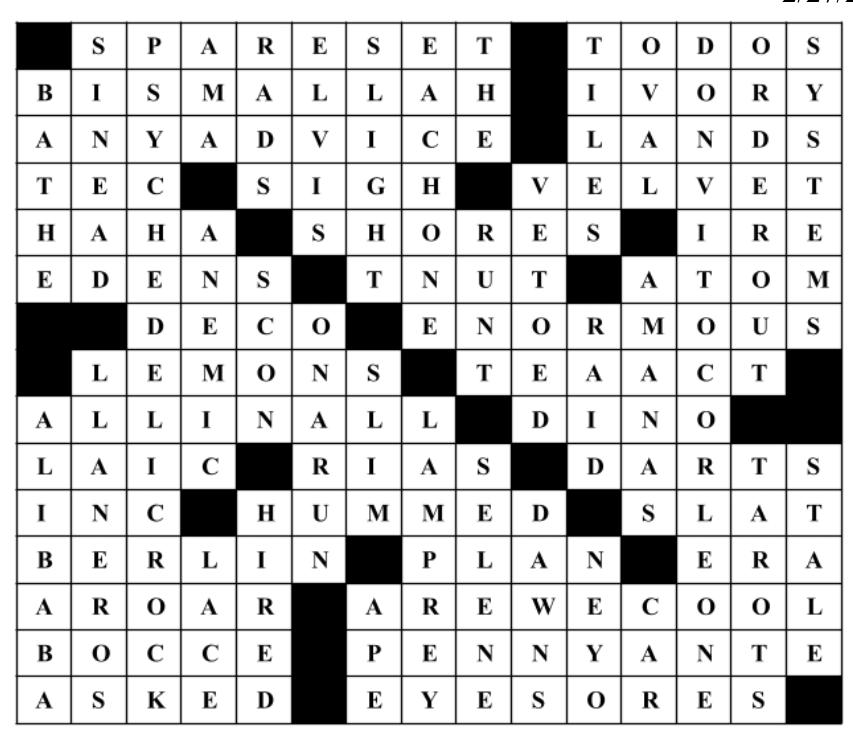
can do that for you.” With that, another satisfying POP left me alone in this strange parking lot. However, this time, I fell toward the asphalt headfrst. I was anticipating the nasty fall, but, as my head hit the foor, I was magically transported back to the bus taking me home earlier. My eyes blinked open, and I was face-to-face with a Unitrans driver. It was still dark outside, but now we were all the way back at the Silo terminal.
“You’re going to need to leave the bus, this was the last route for the night,” the driver said.
I stumbled of of the bus with my backpack in hand. Without any time to process what just happened, the bus driver immediately drove away with my chariot. With a sigh, I pulled out my phone and called a Safe Ride to take me home.
Disclaimer: (Tis article is humor and/ or satire, and its content is purely fctional. Te story and the names of “sources” are fctionalized.)
an important exam and equally applies to handling daily tasks. Te intention and dedication we put into minor aspects of our lives have a great impact, whether it’s the things we physically and psychologically consume — including food and social media — or how we speak to others. And, with each small, deliberate decision, we become closer to success and fulfllment.
Disclaimer: Te views and opinions expressed by individual columnists belong to the columnists alone and do not necessarily indicate the views and opinions held by Te California Aggie.
Tis year, one individual responsible for Datamatch’s advertising, who wishes to remain anonymous, explained their reasons for promoting Datamatch.
“I want to help out my fellow Aggies [and] some friends of mine,” the anonymous source said. “Tere’s all sorts of clubs at UC Davis, but it can be kind of hard for people to try to connect with somebody, and I’m not talking about a hookup or a one-night thing.”
Unlike Steinkemper, the anonymous source did not contact Datamatch or create the survey.
Te last speaker of the day was Forhat Chowdhury, a fellow from Bangladesh who works with refugees afected by disasters. She recognized Feb. 21 as International Mother Language Day and recalled how Bangladesh fought for the preservation of its own language.
“In 1952, we stood up and sacrifced our lives to protect the right to speak Bangla,” Chowdhury said. “We fought and we won. Te spirit of resilience and the refusal to be silenced runs deep in the history of Bangladesh — we are habituated to facing difculties and we still continue to fght for our survival.”
Chowdhury said Bangladesh faces the dangers of cyclones and rising seas, two threats that have only worsened with climate change. However, due to extensive disaster risk reduction eforts, casualties have declined from nearly half a million in 1970 to almost zero in the present day.
“We have built strong shelters which can withstand the hardest, toughest wind; We have created emergency response actions, we have designed foating farms and we have designed food-resistant infrastructure,” Chowdhury said. “Bangladesh has become an example for the whole world in cyclone resistance and disaster risk reduction.”
Chowdhury said Bangladesh’s resilience defines her approach to humanitarian work.
“From the Rohingya community in Cox’s Bazar, Bangladesh to the earthquake-shattered shelters in Syria; from the war-torn Ukrainian roads to the displaced people’s camp in Ethiopia, I have carried Bangladesh with me,” Chowdhury said. “Because resilience is not just about bouncing back — it’s about bouncing forward.”

Avid Reader Bookstore provides a list of books on their website to highlight literature that focuses on telling the stories of powerful women in history as well as the struggles women have endured over time. Some of these include “Te Six: Te Untold Story of America’s First Women Astronauts” by Loren Grush and “Of with Her Head: Tree Tousand Years of Demonizing Women in Power” by Eleanor Herman.
“Women’s History Month is an opportunity to recognize and celebrate the achievements of women throughout history,” Hansen said. “It also encourages conversations about the need for continued progress towards gender equity.”
3
Completely student-run and in association with ASUCD, the zerowaste event is popular among students not only for their festival but also for publicity events. Tese events work to fundraise for WEF and give back to the community of Davis for continuing to
Te bus vanished into thin air, and I was left alone in the parking lot once again. But now, there was another bus standing just a couple of feet away. Tis bus was only one level tall, appearing to be the classic Unitrans bus I know and love. When I stepped onto this bus, the engine rumbled, the lights ficked on and the air started blowing out of the vents. Tis bus felt so familiar that I thought it was the same bus I was on earlier (before I got dumped in this parking lot). I ran over to my spot in the back, but my backpack was nowhere to be found. Ugh.
“HAHAHA you got so excited, didn’t you?” a voice said above me. “I am the Ghost of Unitrans Present, silly.”
I rolled my eyes at these theatrics and waited for my next life lesson. However, before I could ask for any advice, the bus shrieked.
“GIRL, you better lock in — you have a midterm tomorrow!”
POP. Tis bus vanished too. I guess that was my lesson? Well, I was back in my parking lot, but this time I was completely alone. Tat is until I turned around, and there was a bus creeping up on me from behind. It was so quiet that I couldn’t hear its engine running. I ran around to the entrance, which opened with a satisfying “swish” noise. As I entered this bus, all I could hear was a gentle humming and nothing else. Filled with awe, I looked around at the sleek design of this bus. Everything looked like it was made from stainless steel and polished for my arrival. I walked up and down the bus to see all of its modern intricacies.
“Hello. Sorry to interrupt, but I am the Ghost of Unitrans Future,” an alluring female voice said above me. Tis voice was strangely smooth and calming.
“How can I help you?”
“Will I be successful after I graduate? WAIT — will I graduate?” I asked.
“Unfortunately, I am not your crystal ball,” the voice purred (she lowkey ate with that). “But I will tell you that only you can defne your success. No one else
So yeah, maybe it is the phone. An increasingly short attention span paired with several hour-long assignments makes it way easier to put of important tasks for later. Especially when the deadline is days or even weeks away — it feels like we have a surplus of time, so why not scroll just a little longer?
Ten, all of a sudden, it piles up. Before we know it, we have exams, lab reports, homework and readings all due on the same day. Unsurprisingly, we become overwhelmed to fnd that not enough time exists to fnish everything.
Progressively, shortcuts become the preferred solution. From using Artifcial Intelligence assistants like ChatGPT to stealing the answers from peers, students justify their decisions by claiming they couldn’t possibly finish on time or understand the scope of the material. Deep down, we know we are manipulating ourselves — the fantasy we live in is assuming that we will always have more time.
All of us have thus been diagnosed with something terminal: a corruption of the mind. It’s one that relentlessly festers and only results in anxiety and frustration. When the outcome feels predetermined, the motivation to attempt treatment dwindles. Once this conclusion is reached, the natural reaction is to panic — to succumb to a desperate fear that we haven’t lived our life fully, missing out on too many opportunities. In this state, we’re pulled deeper into the search for an escape, for anything that gives us temporary control or relief. Yet, these outlets are often unhealthy, self-destructive habits through which we tear ourselves down, only to fnd they result in the very outcome we fear.
Te solution, or “pointless” treatment, is something unexpected: a positive outlook — a glass-half-full sort of approach. Te kind of mindset that fuels action and gives us a reason to endure the struggle. It reminds us that we get to determine how we use the time we do have left.
Circumstances like this, while unfortunate, can be pivoted into necessary lessons — a wake-up call that procrastination is ultimately fruitless. Tis extends beyond putting of studying for
“I had no affiliation, I had no access,” the anonymous source said. “All I did was help with just advertising. I was trying to put the word out on YikYak.”
Chris Whites, a fourth-year art history major, joined Datamatch in 2024.
“I heard about Datamatch from a fyer on campus that had a QR code on it,” Whites said via email. “I signed up because I thought that it would be a fun way to meet new friends. I flled out the survey and got a few matches with some people but I never actually met up with anyone.”
However, the results of 2024’s Datamatch was not as successful as what was hoped for, according to the anonymous source.
“Unfortunately, the payoff wasn’t quite what I was hoping,” the anonymous source said. “It didn’t work. One of my friends was turned of by all the advertising. So they weren’t even interested and then other people said they didn’t like their matches. Only 331 people signed up to do this. Tere’s not going to be a lot [of options].”
While the future of Datamatch at UC Davis is unclear, there is a path for university-specific dating sites, with 38% of Harvard students using Datamatch and 25% of Cornell University’s student body using a site called Perfect Match.
Te anonymous source was skeptical about the future of Datamatch, citing the lack of awareness and limited timeframe of the site.
“It’s not really that well known,” the anonymous source said. “Te problem is, while I think it’s a really cool service, it’s only open one week of the year for Valentine’s Day, which is problematic.” In the future, Datamatch could end up being a popular form of online dating at UC Davis. However, while Datamatch holds a presence on other university campuses, the percentage of users at UC Davis have been decreasing over the last few years. Whatever happens, Datamatch and similar smallscale dating services prove an interesting method of fnding love in college.


A recap of the 2025 Big West Swimming & Diving Championships successes
BY DIEGO CERNA sports@theaggie.org
From Feb. 12 to 15, the UC Davis women’s swimming and diving team competed in the Big West Conference Swimming & Diving Championships that took place at the University of Houston’s Campus Recreation and Wellness Center (CRWC) Natatorium in Texas.
Previously, the UC Davis Aggies had competed in the Mountain Pacifc Sports Federation (MPSF) Conference for the past 15 years. Tis year marked the frst time the Big West has hosted a swimming and diving championship since 2010, which also happened to be the last time UC Davis captured their last win in the Big West Championships. Te frst day of the competition showcased the team medley — a mix of freestyle, backstroke, breaststroke and butterfy between four swimmers. Emily Scheberies, a second-year communications major, went first with a 50-meter backstroke, earning a time of 25.95 seconds. Sam Rhodes, a fourth-year neurobiology, physiology and behavior major, continued the second leg of the breaststroke with a time of 28.31 seconds. Brynn Graham, a second-year mechanical engineering major, carried the third leg of the event, the butterfy, with a time of 24.97 seconds. To fnish the medley, Sophi MacKay, a second-year communications major, closed with a time of 22.41 seconds. Te overall time, in minutes, for the team was 1:47, securing the team the fourth spot overall.
Ten came the 800m relay, where four team members completed 200m freestyle each, which is four laps in the pool, measured in minutes. Elsie Luisetti, a second-year food science major, started strong with a time of 1:51. Katie McLain, a fourth-year communications and international relations double major, entered during the second leg with a backstroke time of 1:50, leading Rhodes into the third leg with a time of 1:50. MacKay anchored again, fnishing of with a time of 1:49. Te team ended with an overall time of 7:21, improving by 12 seconds from their season’s previous best.
Day two featured the one-meter contest, where divers were required to perform a series of movements as they jumped of of a springboard into the pool. Divers are scored based on execution and degree of difculty.
Five Aggie divers made it past the preliminary rounds. This included Leila Busch, a fourth-year human
development major, Taylor Schwarz, a fourth-year neurobiology, physiology and behavior major, Priscilla Nguyen, a third-year biological sciences major, Mackenzie Young, a third-year animal science and management major, and Katherine Lim, a first-year animal science major.
MacKay was one of the only Aggies to compete in the 50m dash, where she placed third overall, swimming a personal best of 22.02 seconds. Within milliseconds, McLain, the only other Aggie to compete in the 50m dash, fnished right after in fourth place with a time of 23.06 seconds.
In the 200m freestyle relay, MacKay and McLain were accompanied by Christy Douglas, a fourth-year neurobiology, physiology and behavior major, and Anna Boyer, a third-year undeclared major, in the closest race of the championships. Tey ended up fourth overall, only within a second of the three places ahead. Te overall time clocked at 1:31.60 minutes, almost surpassing the Aggies’ previous all-time record of 1:31:42 minutes. Tis same quad would also end up placing third overall in the 400m freestyle relay, having a time of 3:20 minutes, marking the last event of day four.
On the third day, the 400m medley relay featured Scheberies, McLain, Graham and Rhodes. Tey fnished on the podium in third with a time of 3:43 minutes. Rhodes would also record a personal best in the 400m fnals, coming in third overall with a time of 4:16 minutes, which was three seconds improved from her previous best.
Te last day of the competition mainly highlighted the diving squad. Young fnished as the highest-ranking Aggie with a silver medal on the platform, and Lim earned a third-place fnish in the long fall. Lauren Kudo, a frst-year undeclared major, Schwarz and Busch all placed in the top eight.
Phil Tonne, one of the diving team’s head coaches, was also named the Big West Diving Co-Coach of the Year on Friday, Feb. 21. He helped eight of the Aggie medalists reach the podium throughout the championships, striving for tremendous improvements among the team in the one- and three-meter dives.
Overall, the Big West Championships proved to be a success for the Aggies. Multiple UC Davis team members medaled, records were broken and personal bests were improved. Te Aggies will look forward to bringing this momentum with them into the 2025-2026 season, building on their strong achievements.

The Aggies won three of four home games on Feb. 22 and 23
BY LUCIENNE BROOKER sports@theaggie.org
After a long of-season, the UC Davis women’s beach volleyball team returned to the court on Feb. 22 for the frst of their four games that weekend. Coming back from their loss to the University of Hawai’i at Mānoa at the Big West Beach Volleyball Championship last April, the UC Davis Aggies were looking to start the new season of with a string of wins.
Teir frst matchup in the doubles competition saw them face of against the University of Utah. Utah opened the competition with a bang, taking the frst matches without much resistance. However, the Aggies fought back to take the third match, with Alexandra Leal, a second-year environmental engineering major, and Kate O’Steen, a third-year human development major, clawing their way to victory. Tey won the third
Missed free throws and late-game fouls resulted in the Aggies’ defeat
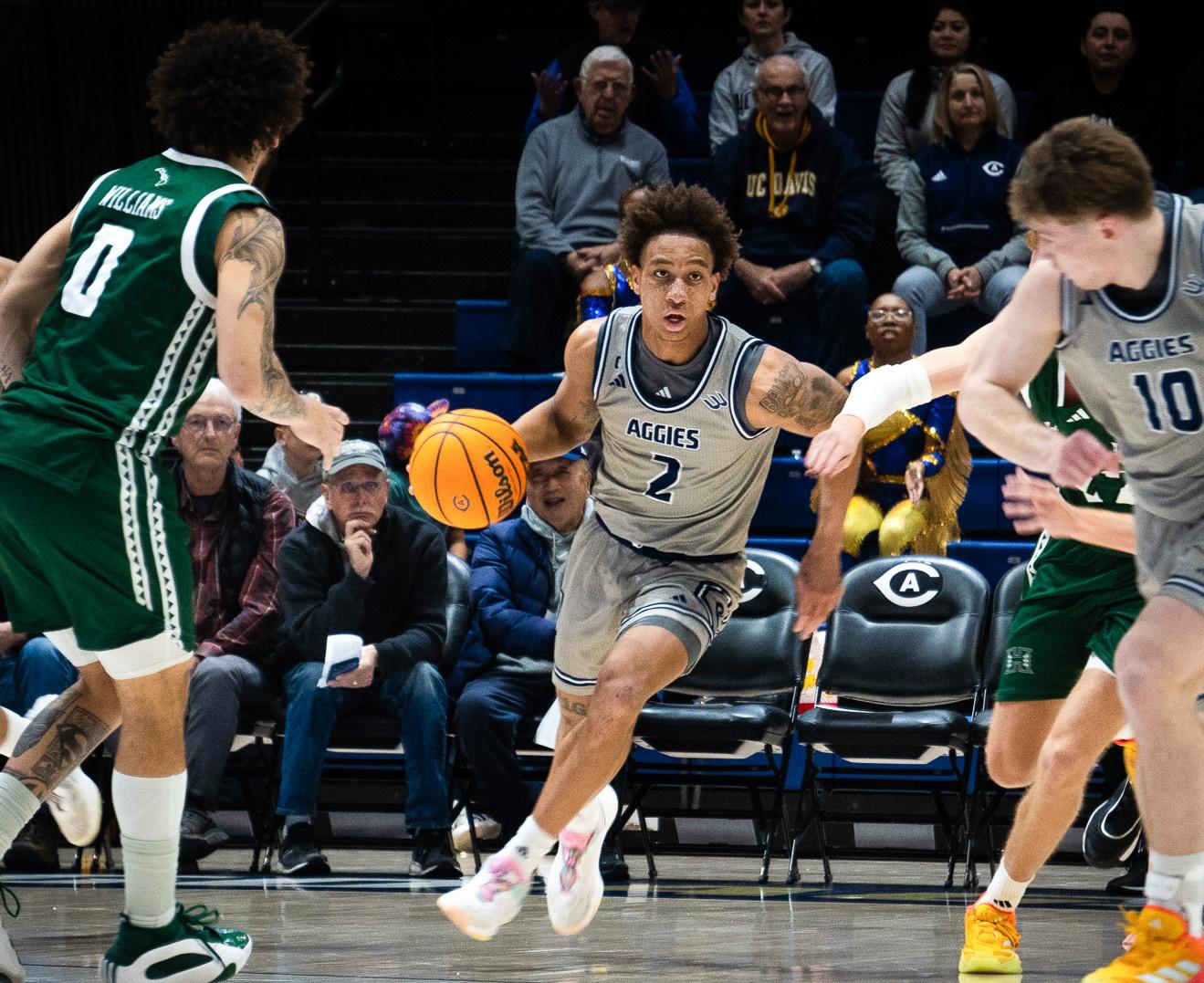
BY COLINA HARVEY sports@theaggie.org
On Feb. 20, the men’s basketball team faced of against the California State University, Bakersfeld Roadrunners in one of their last home games. With the Big West Championships rapidly approaching, every game could help the UC Davis Aggies achieve a higher seeding position.
Te last three home games of the season are set to be tough for the Aggies, as they are pitted against the top three teams in the Big West. However, the game against Bakersfield, who has struggled this season in conference games, did not predict an Aggie defeat.
Despite this, the Aggies were not able to clinch the victory and were defeated 66-71. Te win was within reach for the Aggies, and they ultimately lost due to unforced errors rather than the Roadrunners’ performance.
The Aggies had a strong start, with Connor Sevilla, a second-year undeclared major, and Carl Daughtery Jr., a third-year human development major, making two three-pointers each in the frst 10 minutes. However, the Roadrunners fred back with threepointers of their own, many coming from Marvin McGhee III. Te Aggies led by as much as seven points early in the game, but a three-pointer from McGhee with 11 minutes to go in the half gave Bakersfeld the lead.
Additionally, Bakersfeld’s CJ Hardy sustained an injury after about seven minutes of play, resulting in bleeding on the court that had to be cleaned up and a long break from the game. As the Aggies began to struggle following the unplanned pause, it is a possibility that it interfered with the players’ momentum.
Despite the early lead from UC Davis, the last 10 minutes of the frst half were even. On the last possession by the Aggies, TY Johnson, a fourthyear communications major, assisted a layup by Pablo Tamba, fourth-
year communications major, cutting Bakersfeld’s lead to one. Free throw shooting that was not up to usual standards by the Aggies was a contributing factor to Bakersfeld’s lead going into halftime. Despite getting to the line seven times, the team was only able to score two free throws.
Additionally, McGhee was on fre in the frst half and accounted for almost half of the Roadrunners’ points, with a total of 14.
Te second half did not have an encouraging start for the Aggies. A turnover by Johnson, a pair of missed three-pointers by Sevilla and a foul by Niko Rocak, a graduate student in the Master of Business Administration program, after falling for a pump fake were some of the plays that allowed Bakersfeld to create the divide. Within the frst six minutes, the Roadrunners increased their lead to seven points. Another series of unfortunate plays damaged the Aggies’ chance even more. Within two minutes, the Roadrunners got a buzzer-beating tip-in, Tamba and Daughtery Jr. both committed turnovers and Tamba faced a powerful block from Bakersfeld while trying to drive the lane.
With less than 10 minutes to go, two big three-pointers from Leo DeBruhl, a fourth-year sociology major, gave UC Davis-supporting attendees hope that a comeback was imminent. However, Bakersfeld responded with a couple of three-pointers of their own.
Johnson then hit a pair of clutch three-pointers. Unfortunately, he was fouled on the second and failed to convert the free throw. DeBruhl was also fouled on a made layup and was similarly unable to make the extra point.
With 90 seconds to go, Bakersfeld led by eight points. At this time, the Aggies overcoming the deficit was unlikely, but a step-back three-pointer by Sevilla put a UC Davis win back in the realm of possibility.
With less than a minute to go, Tamba made a two-pointer in the paint and was fouled, which turned it into a three-point play. Ten, a turnover by
Bakersfeld gave the ball back to the Aggies, resulting in a clutch corner three-pointer by Johnson. Tis cut the score gap to one with 53 seconds to go. In order to win, the Aggies needed to play strong defense on the Roadrunners’ next play, preferably without fouling, and get the rebound. Unfortunately, the Roadrunners got the ofensive rebound of of a missed shot and were then fouled by Tamba. Te Roadrunners made both of their free throws, something that had been difcult for the Aggies to do throughout the game. With the Bakersfeld lead back up to three, DeBruhl drove the lane on the other end. He was blocked by Bakersfeld, with Johnson fouling on the Bakersfeld rebound. Again, the Roadrunners netted both free throws, raising the lead to fve with only 18 seconds to go. Johnson rushed to the other end of the court in an attempt to decrease the point defcit, but it was not enough for the Aggies to claim the win. Ultimately, the Aggies lost this lateseason matchup 66-71. A big portion of this loss can be attributed to the Aggies’ uncharacteristically poor free throw shooting. While Bakersfeld shot 82.1% from the line, Davis shot only 40.9%. Te team made only nine free throws compared to Bakersfeld’s 23. Late-game fouls also hurt the Aggies, as they allowed Bakersfeld to up their lead in the moments where it counted the most. Excluding a few bouts of explosive scoring late in the game, there was no Aggie player who put up a truly impressive performance. UC Davis went on to face the University of Hawai’i at Mānoa on March 1 and lost 70-78, but the team is set to play UC Irvine and UC San Diego. Following a losing streak, these tough matchups will likely test the Aggies, but an improvement in gameplay in the last few matchups will allow the Aggies to fnish out the season strong.
match with a score of 25-23 in the frst set and 21-16 in the second. However, this victorious win didn’t last long. Utah regained their advantage and won the remaining two matches, making the fnal score 4-1, the only match won by the Aggies from Leal and O’Steen. Although it wasn’t the start to the season the Aggies wanted, they had to regroup quickly for their next game that afternoon against the Santa Clara University Broncos.
UC Davis was able to learn from their mistakes during the morning game and came out strong against the Broncos. Tabitha Mitchell, a fourthyear animal science major, and Lindsay Heller, a fourth-year communications major, took to the court frst and swept Santa Clara away, taking both sets by large margins, 21-10, 21-15. Te Broncos took the second match, but the Aggies found the advantage again in the third match with the Leal and O’Steen pairing, with a fnal score
of 21-18, 17-21, 17-15. Tey added to this margin of victory in the fourth match as Skye Smolinski, a second-year design major, and Mia Olen, a fourthyear environmental policy and planning major, won in three sets, 22-24, 21-18, 15-3. While Santa Clara won the fnal point, the Aggies held on and claimed their frst win of the season, 3-2. Tere was little time to celebrate this victory, as they took the court again the following day in the afternoon, facing of against the San José State University Spartans. Heller and Mitchell got things started again, where they were able to win the frst two sets right away, 21-16, 21-17. Tis game mirrored the previous one against Santa Clara closely, as the Aggies again failed to win the second match but ultimately prevailed to win matches three and four, with a fnal point score 3-2. Leal and O’Steen were victorious again, as were Smolinski and Olen. For the fnal match of the weekend, the Aggies took on the Broncos again and defeated them by the same score of 3-2. Te Mitchell and Heller pairing and the Leal and O’Steen pairing were winners once again, but this time, Smolinski and Olen narrowly lost to their opponents in the fourth match. However, Juliana Chapman, a secondyear life sciences major, and Kaitlyn Smyth, a second-year computer science major, stepped up and gave the Aggies the win in the fnal part of the match, 21-17, 21-17. Next up, the Aggies will head to
University of California, Berkeley to participate in the Battle for the Bay. Matchups include UC Berkeley, University of the Pacifc, Saint Mary’s College and San José State University.
After the strong start to their season, they will be looking to continue to rack up wins and improve their ranking early on.
